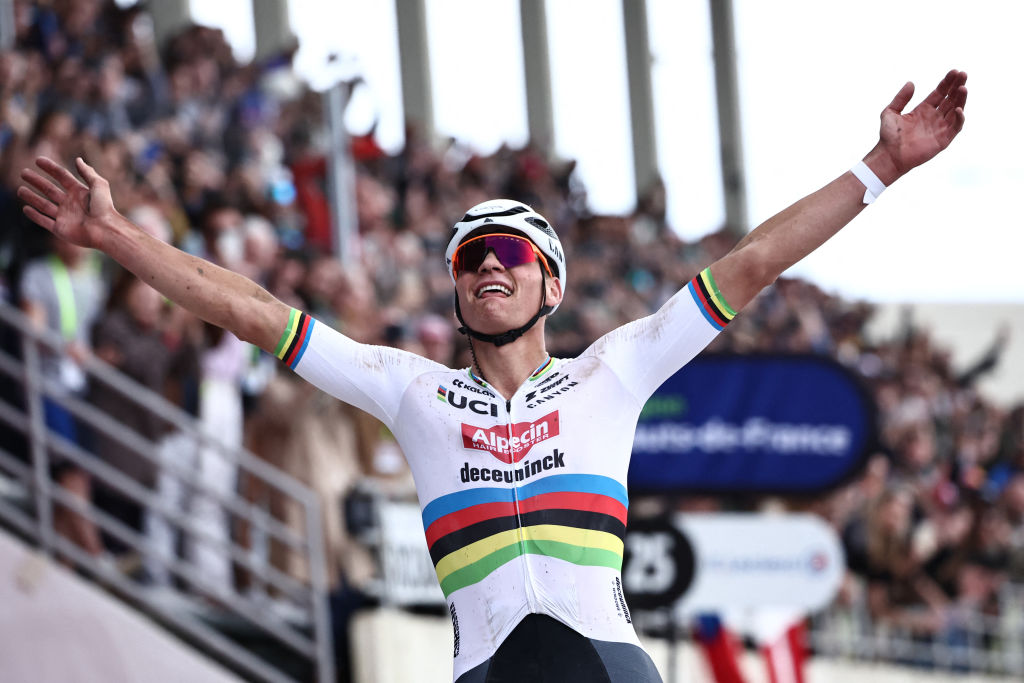
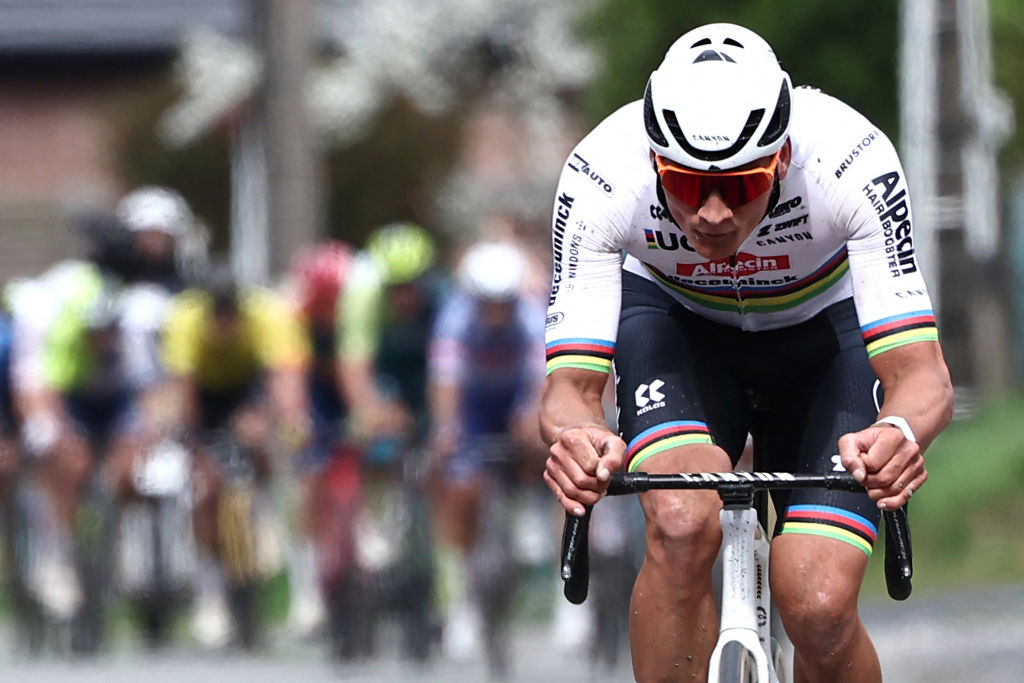
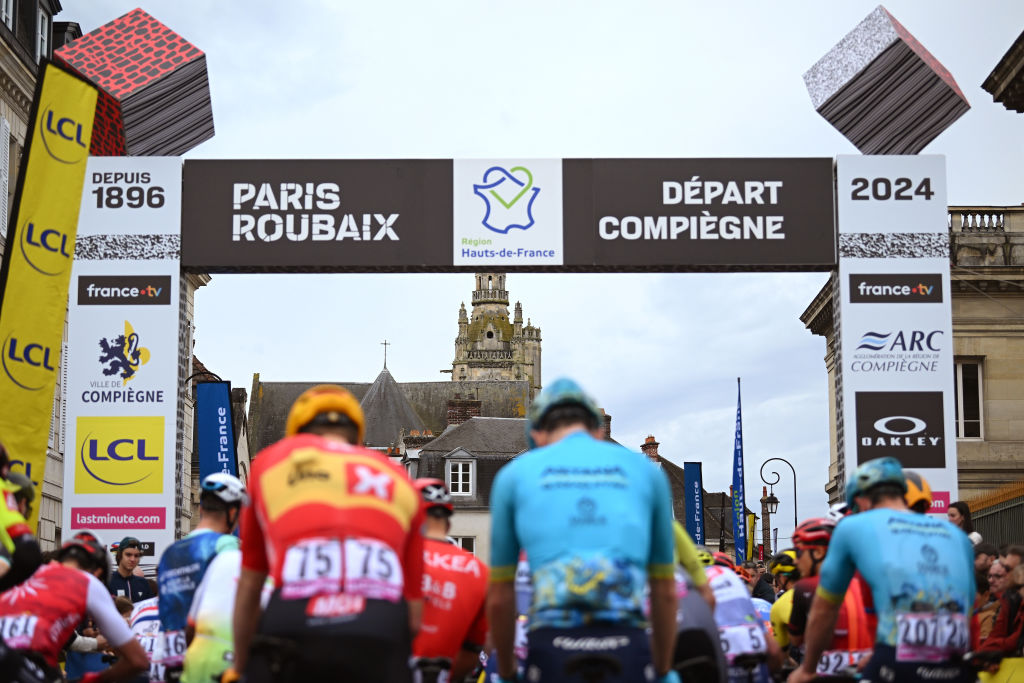
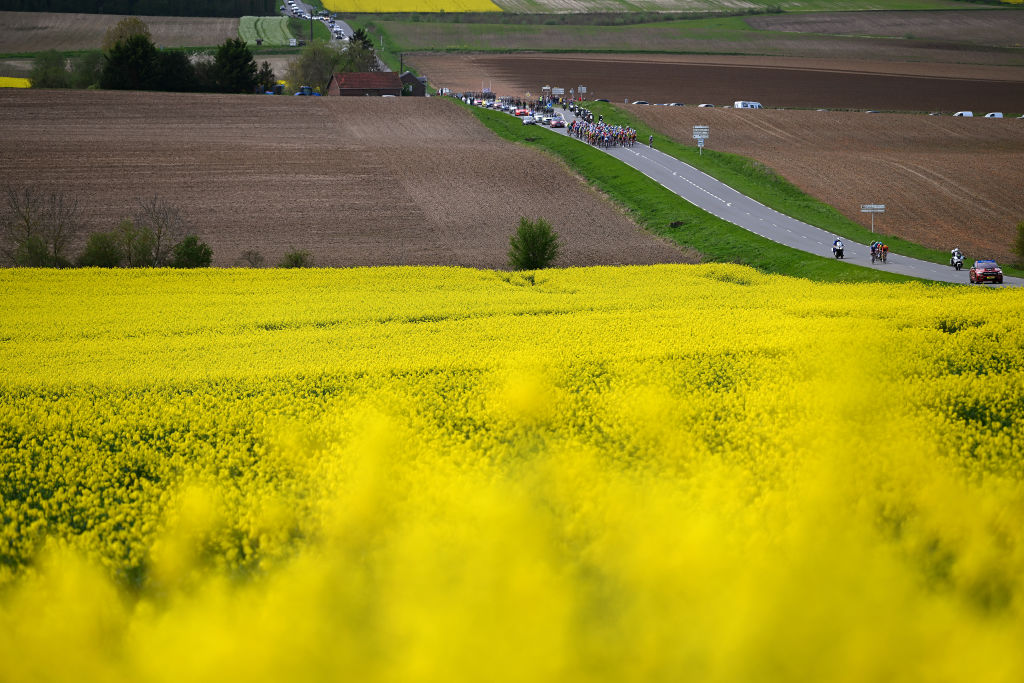
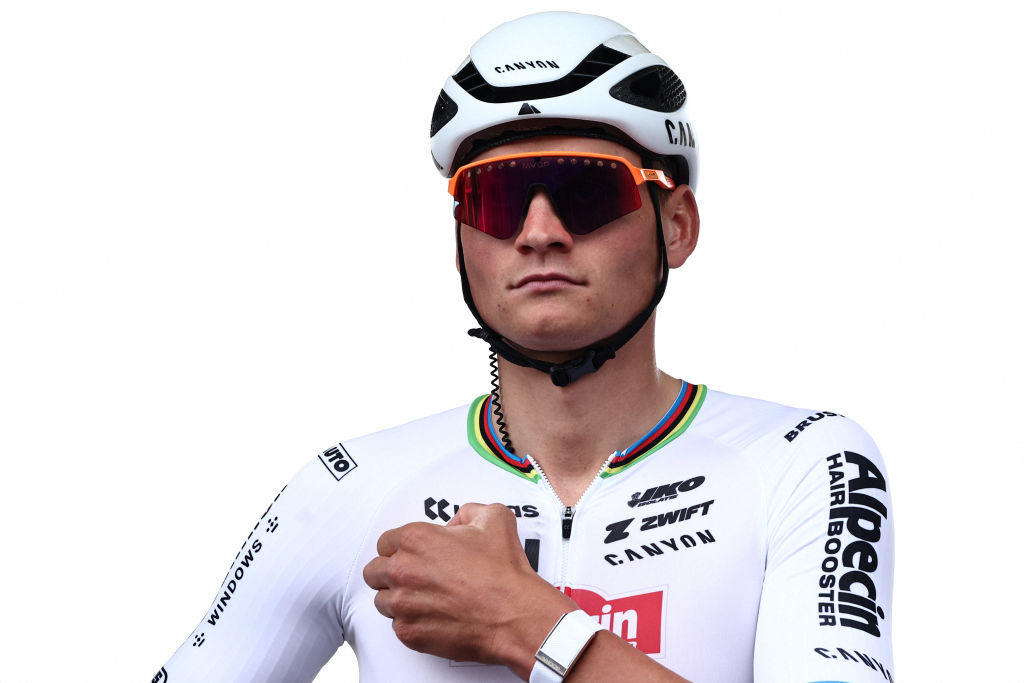
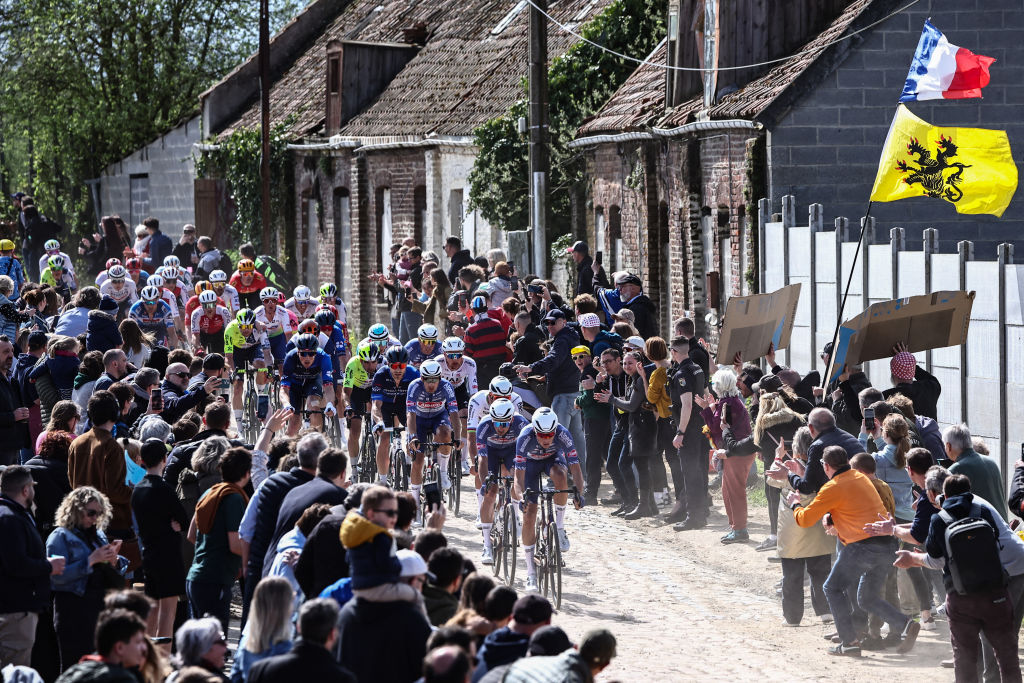
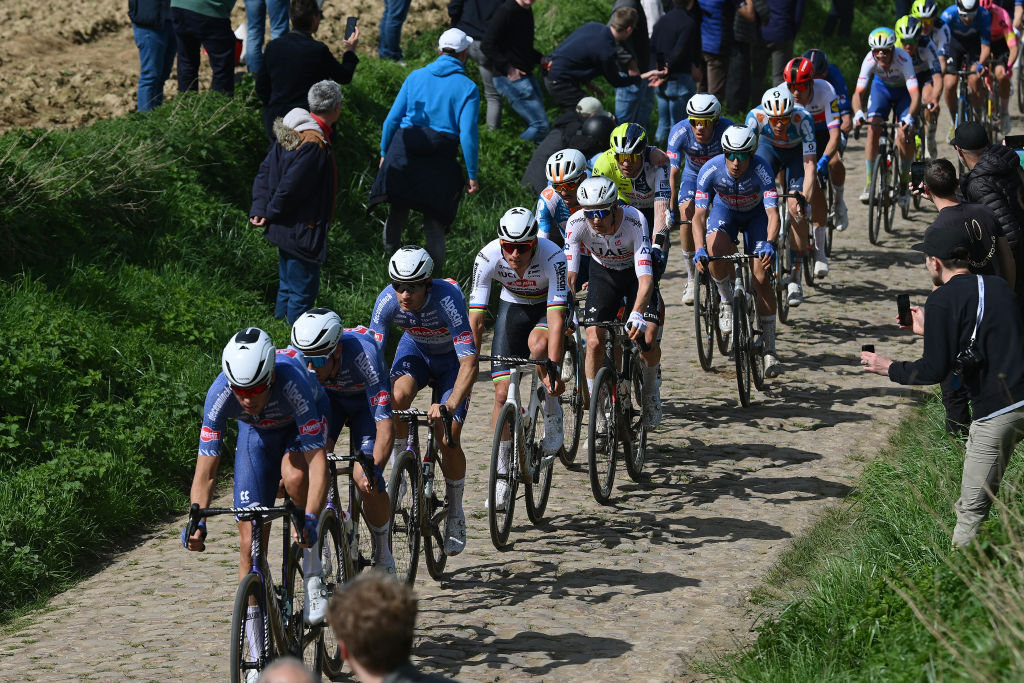
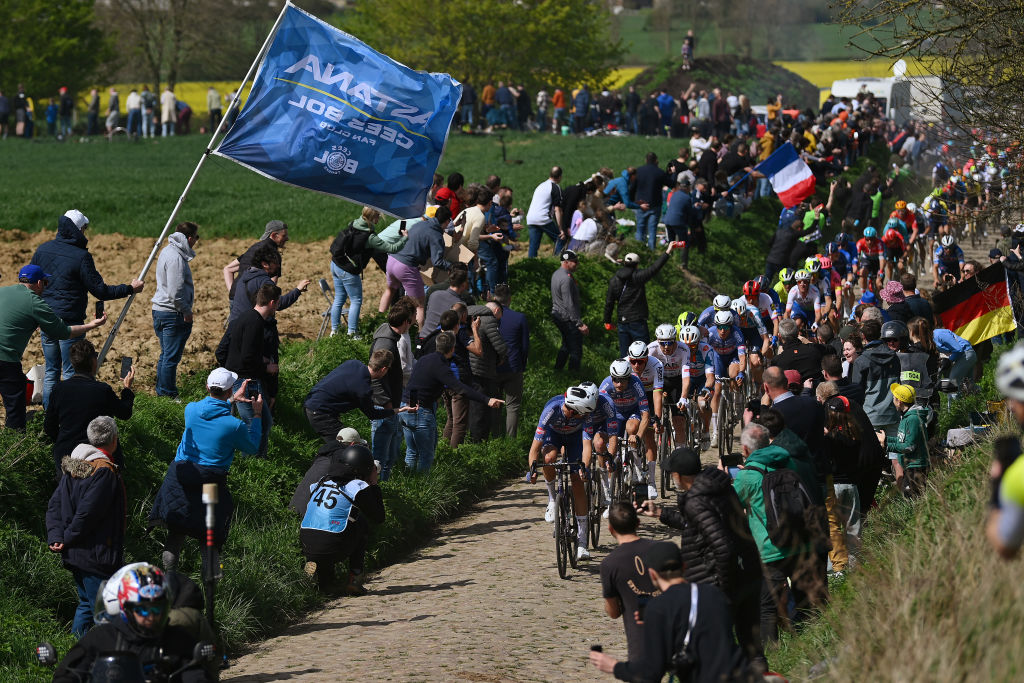
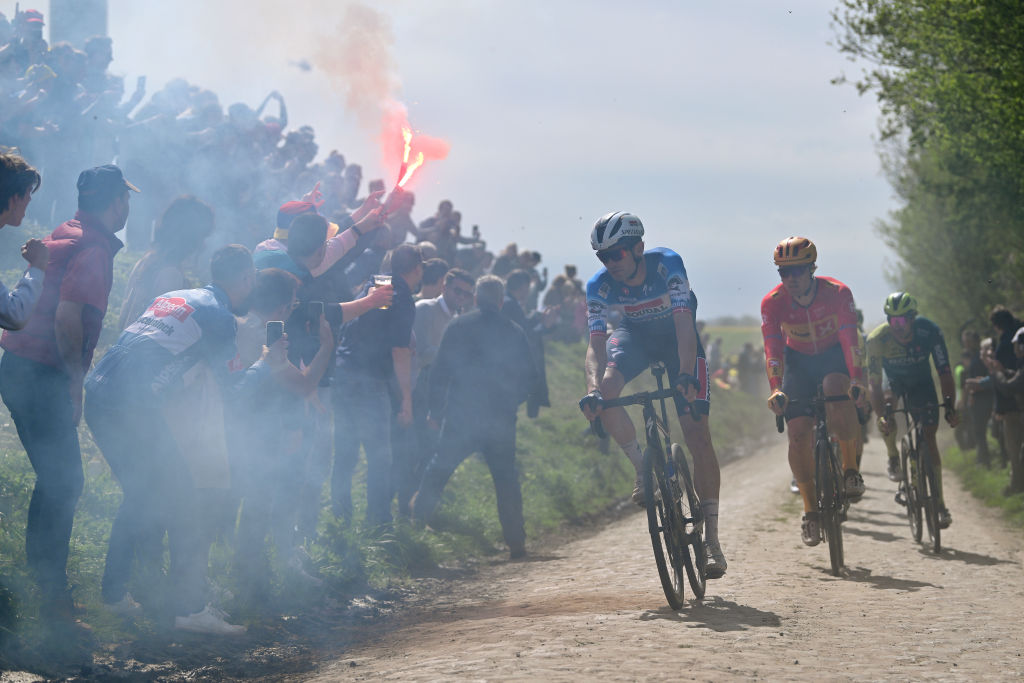
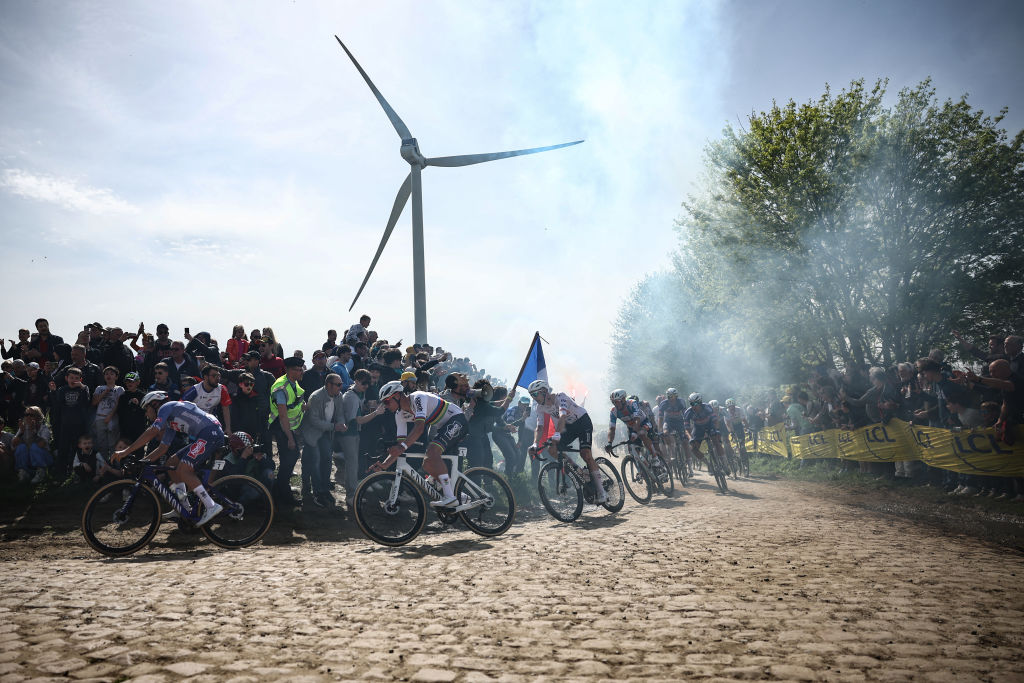
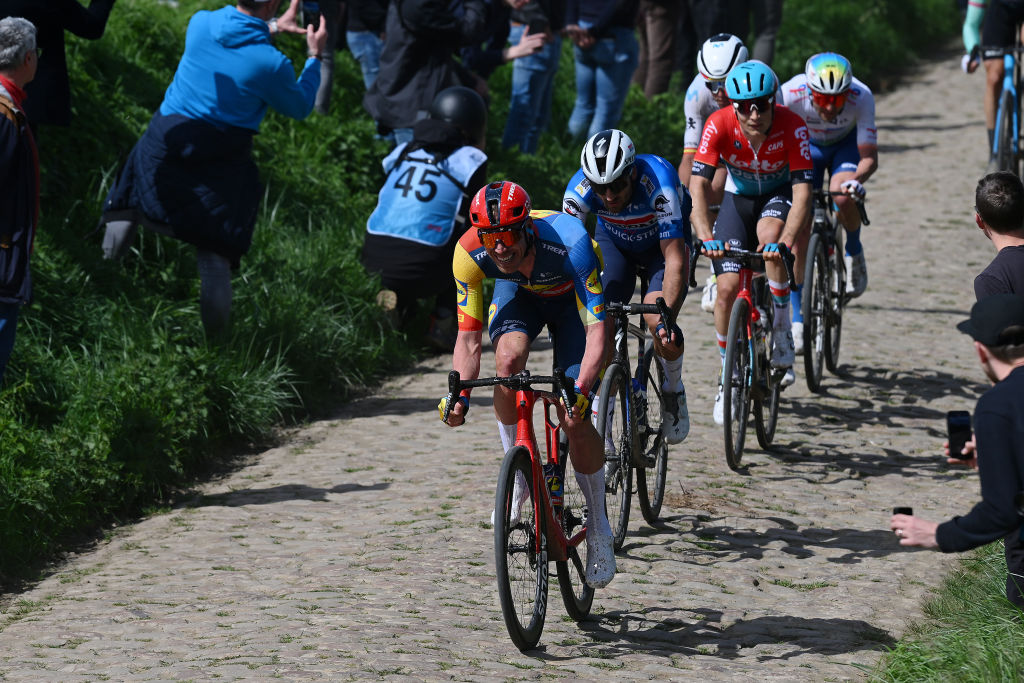
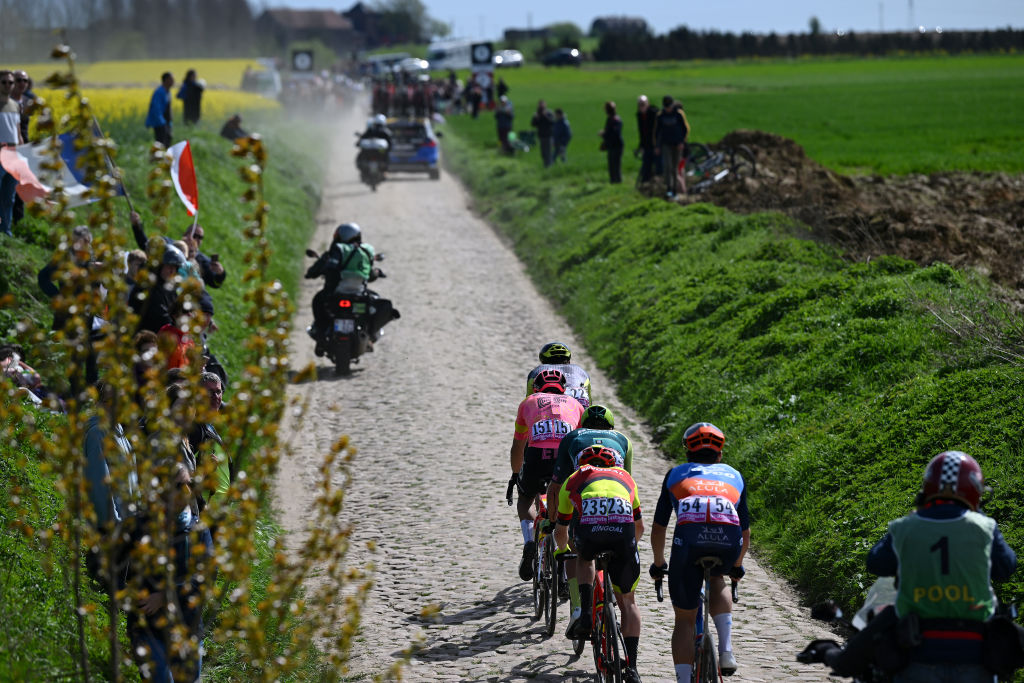
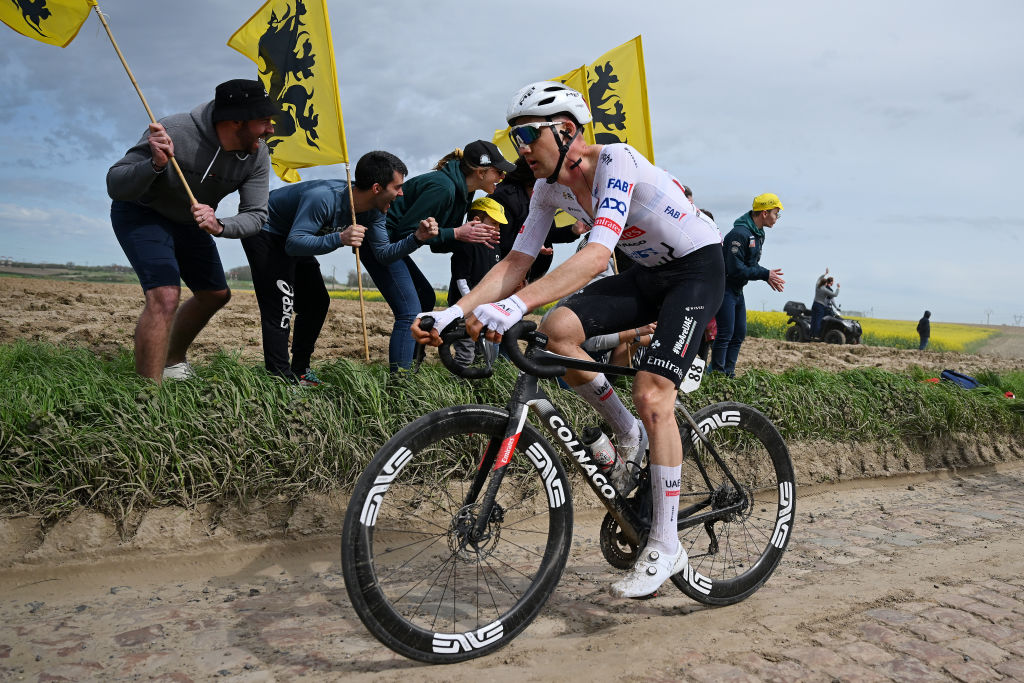
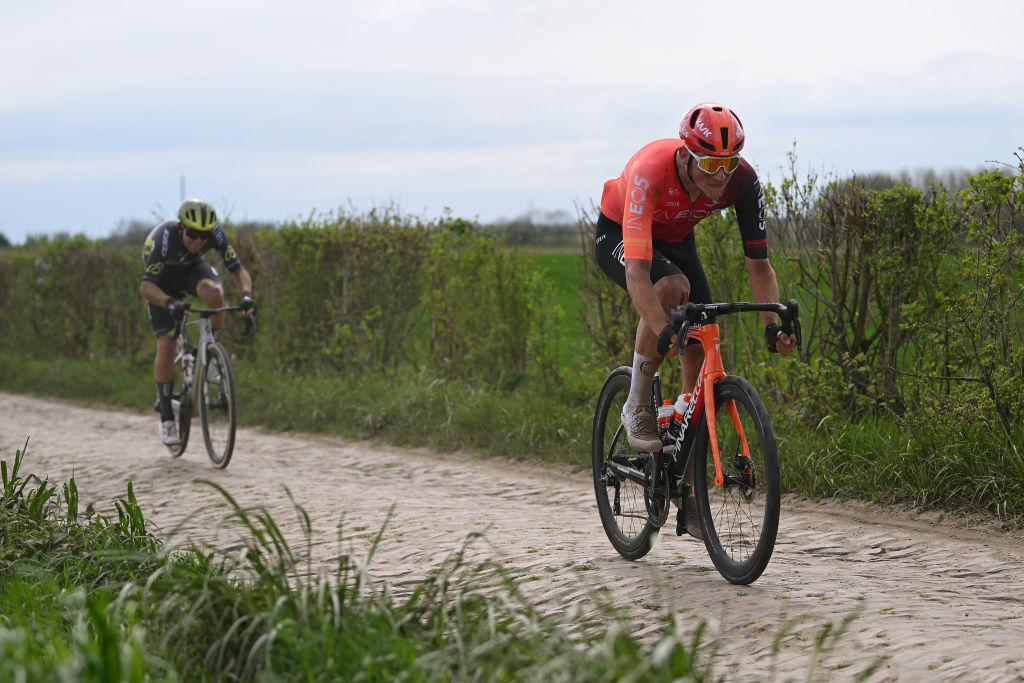
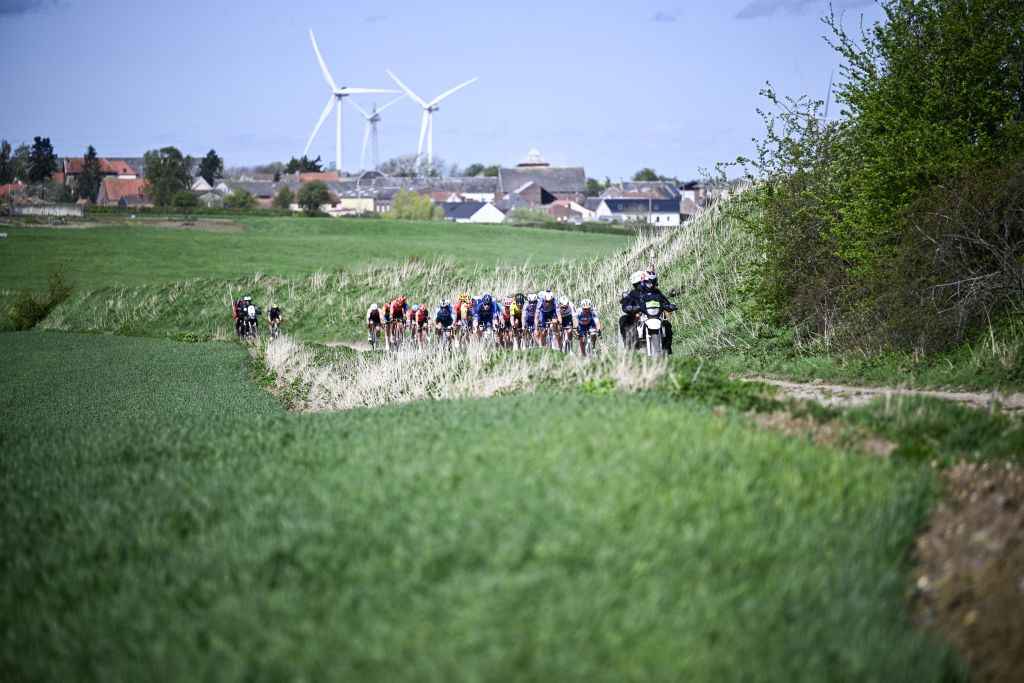
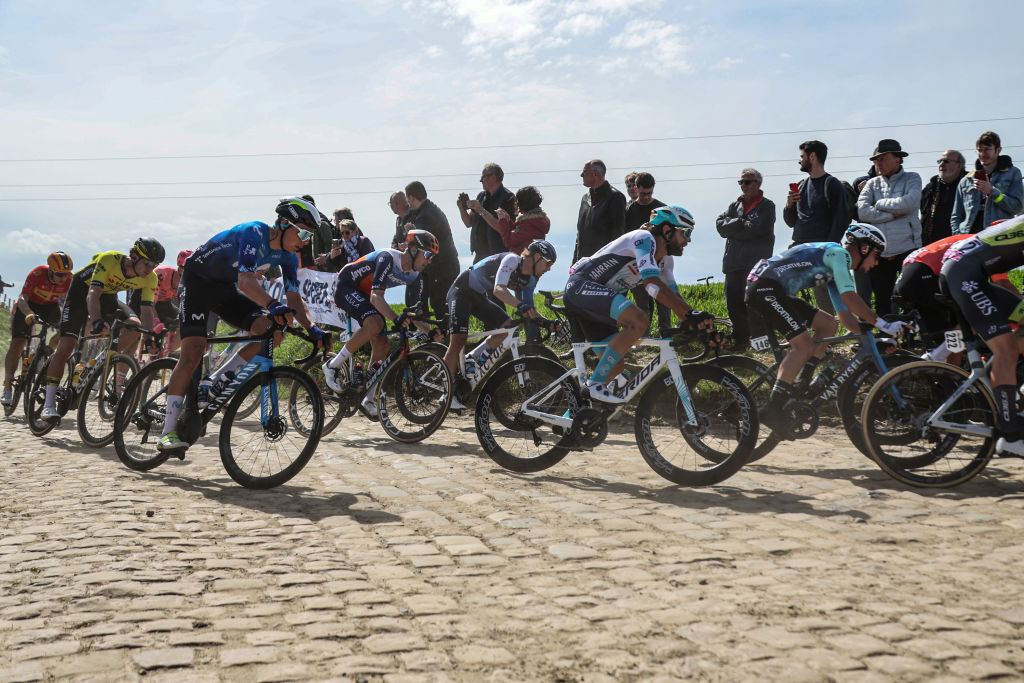
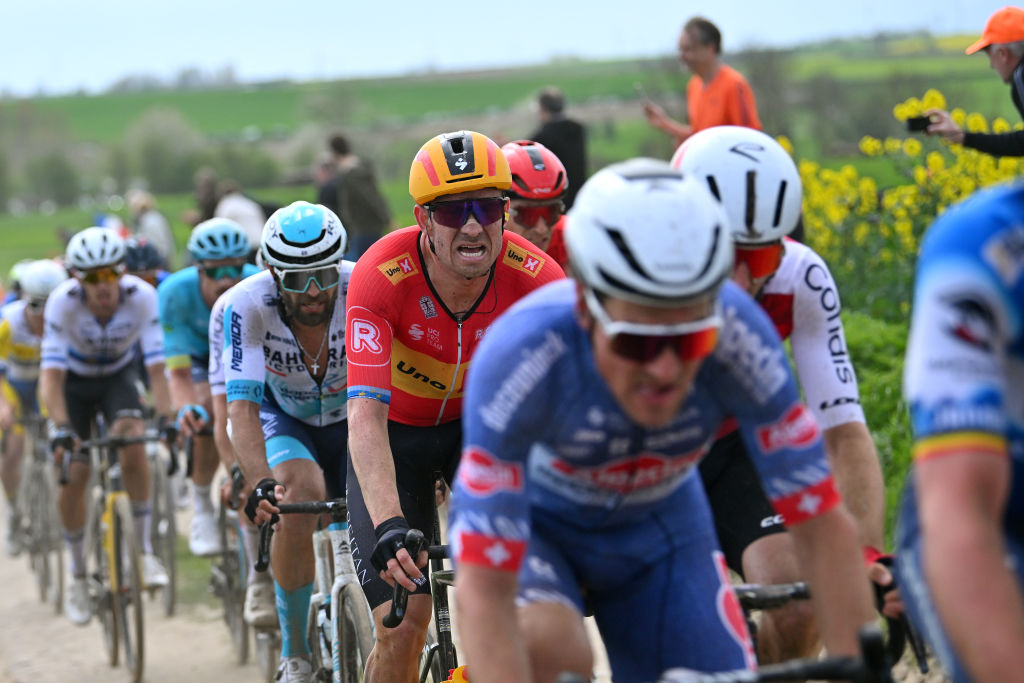
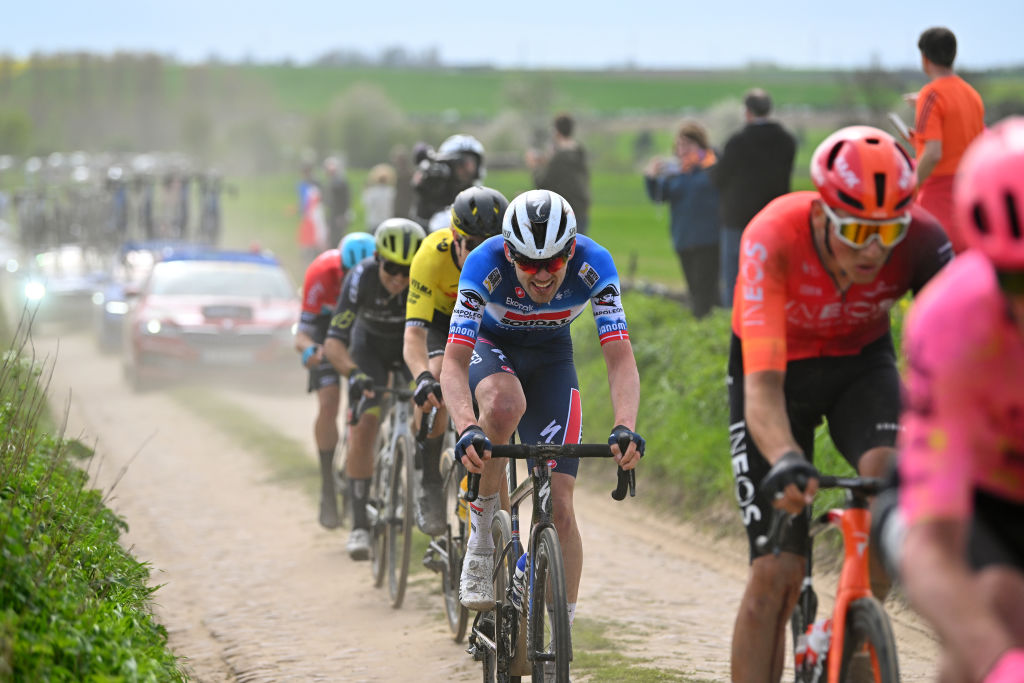
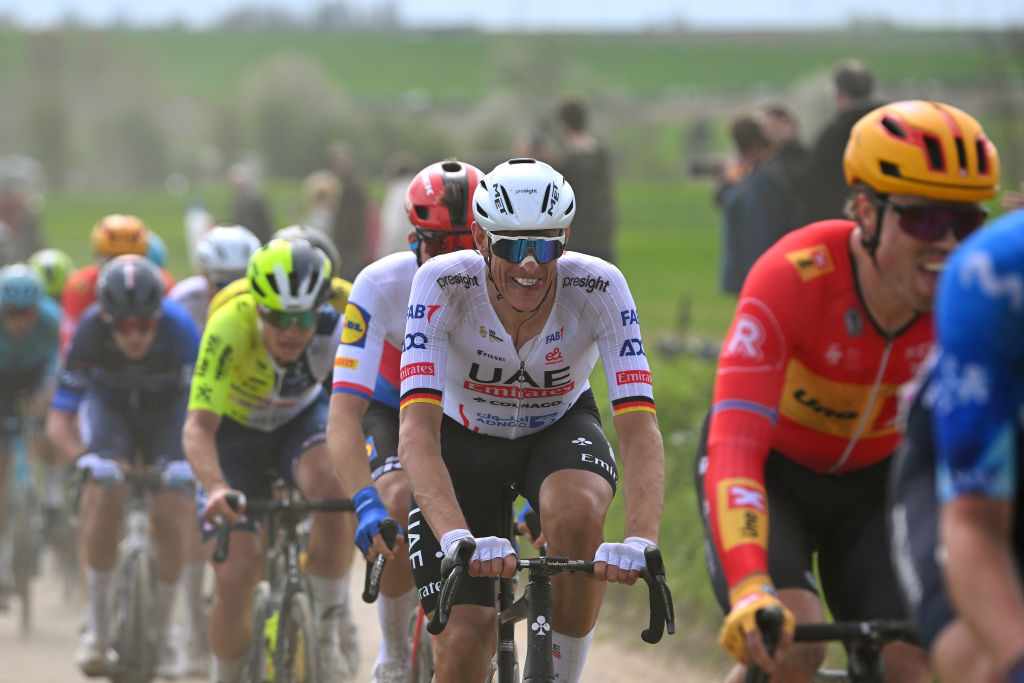
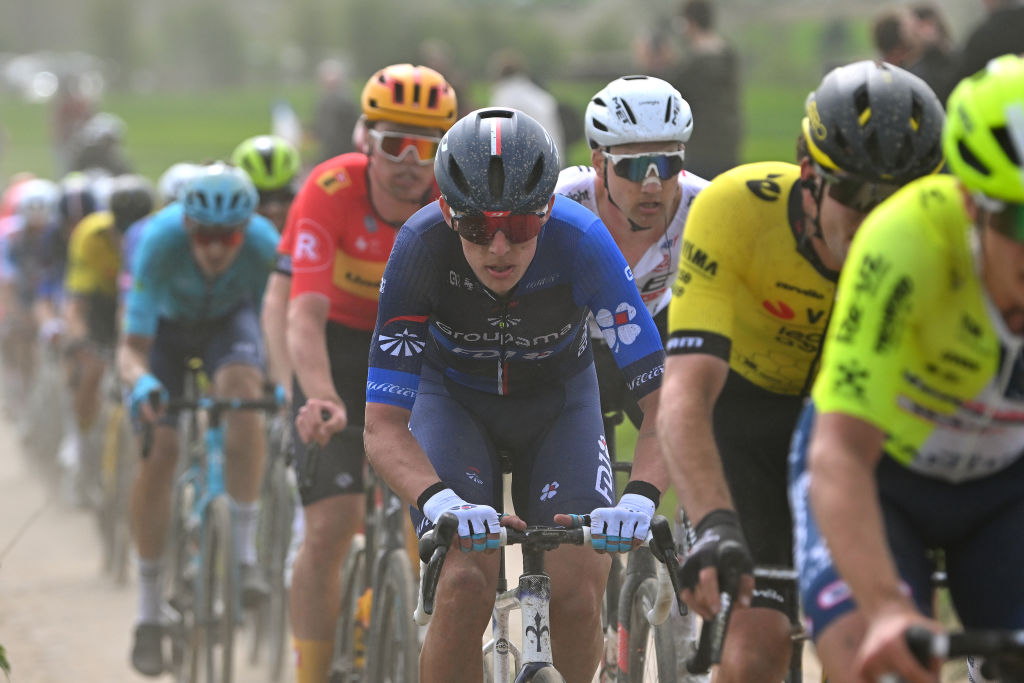
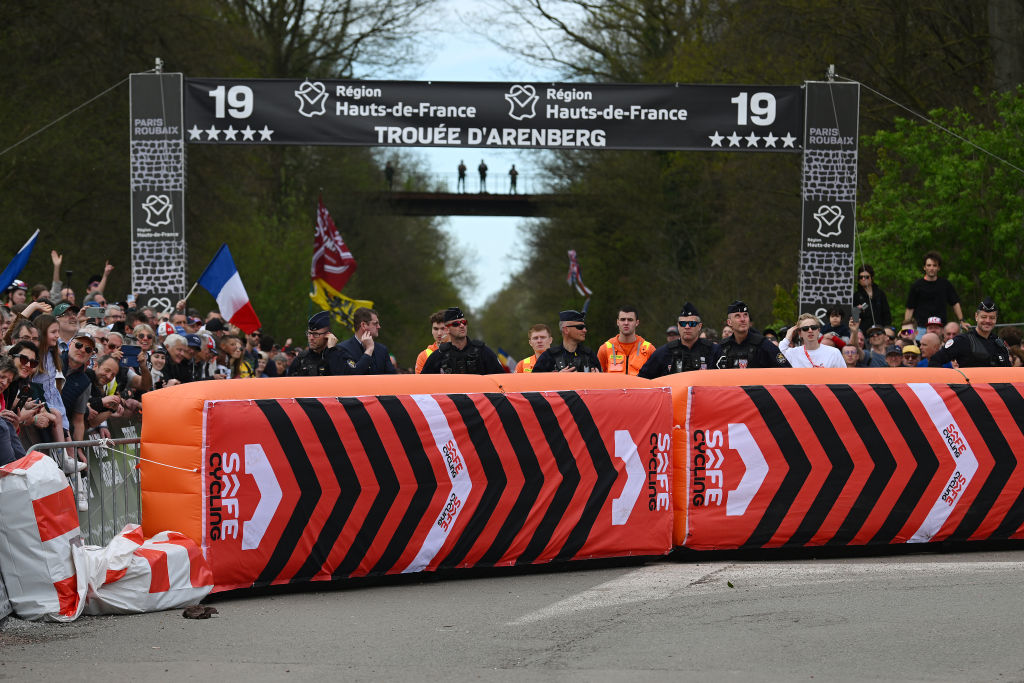
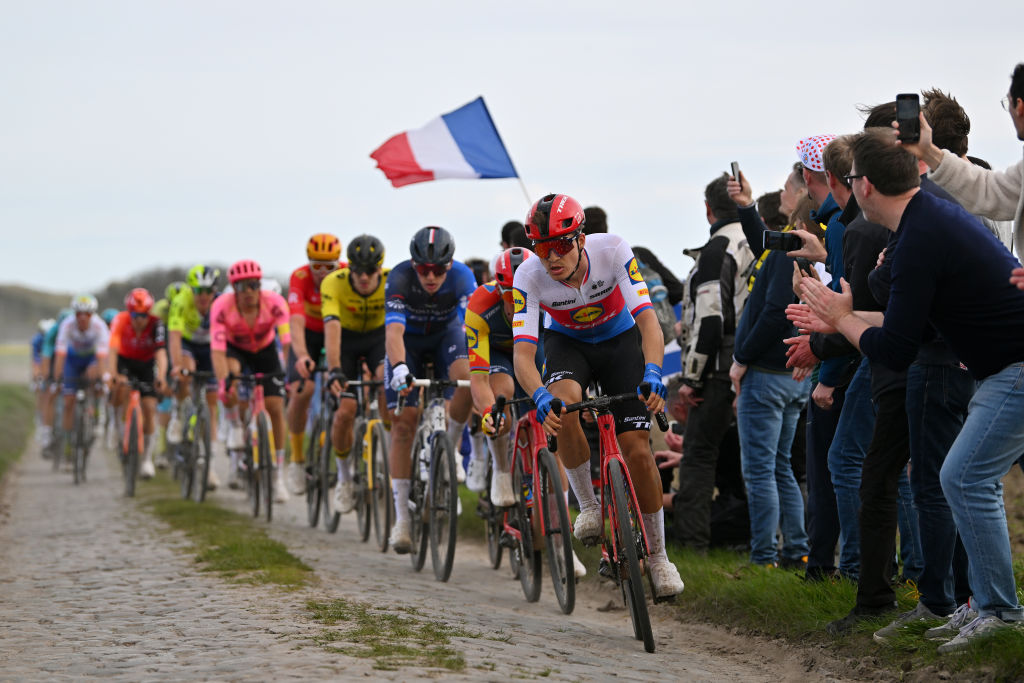
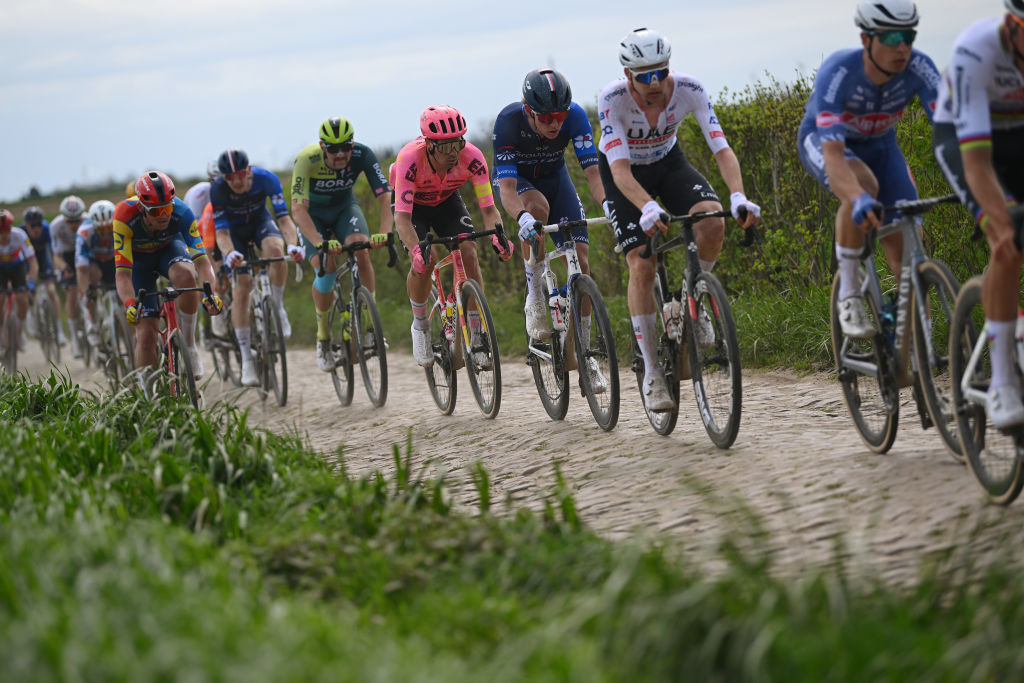
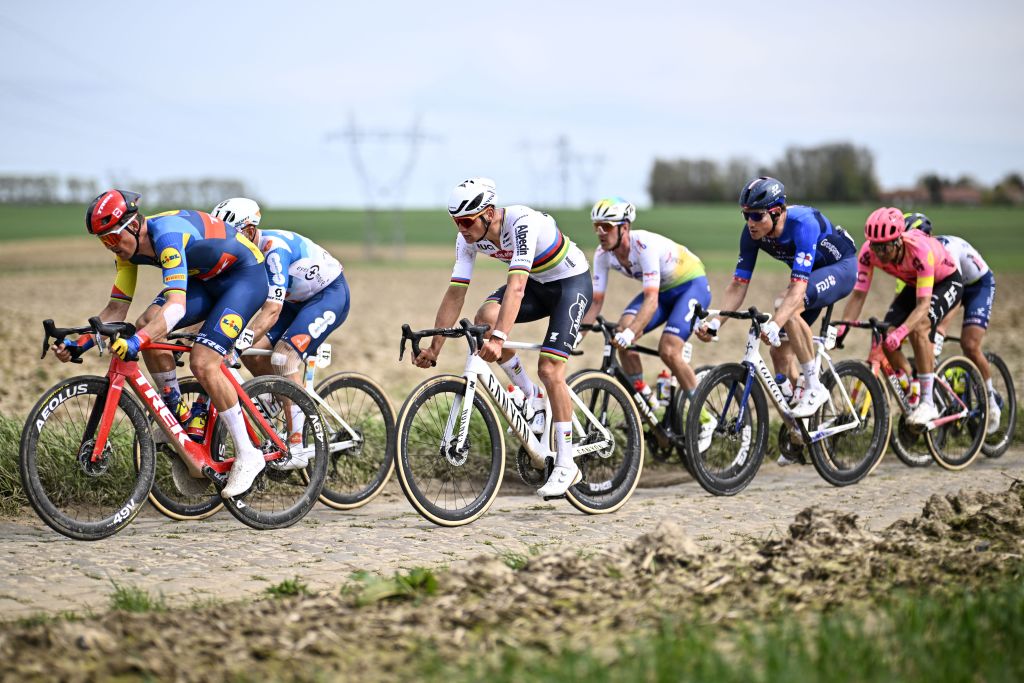
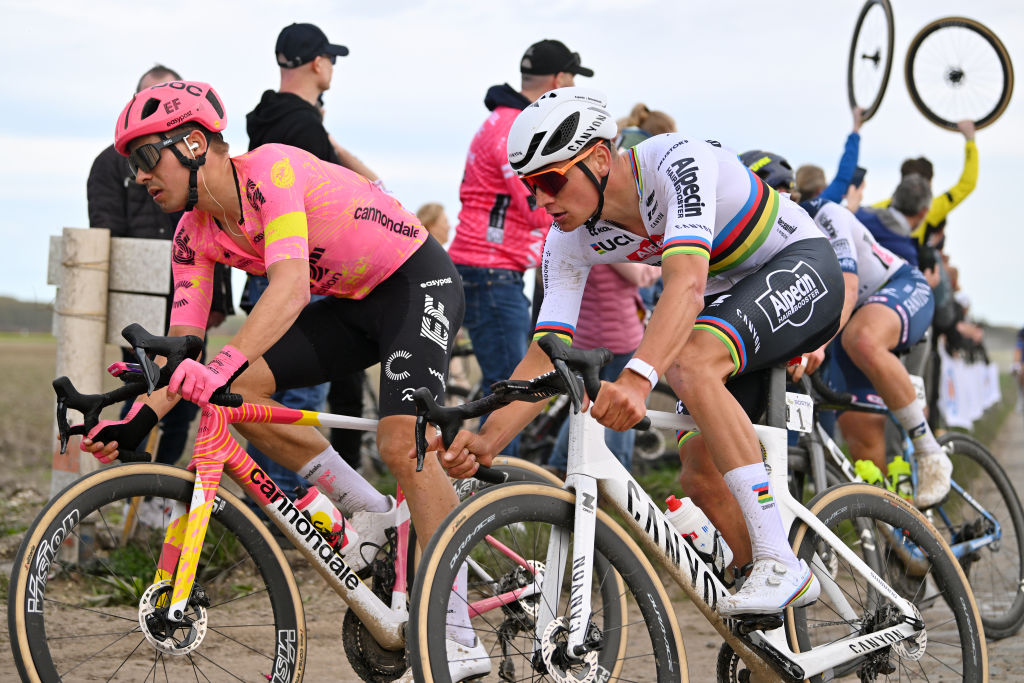
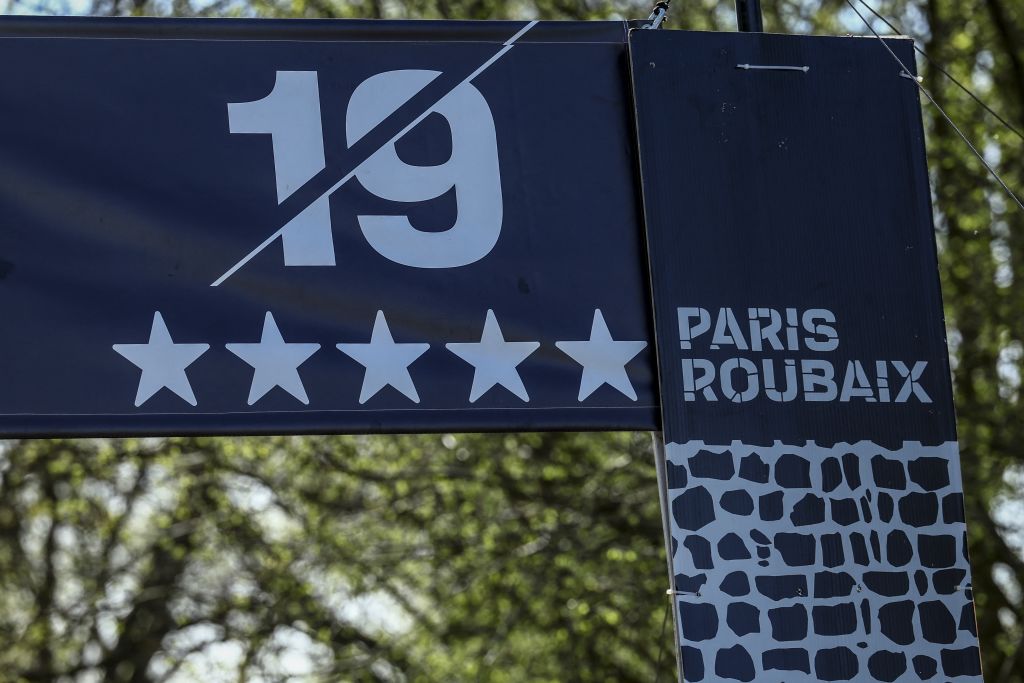
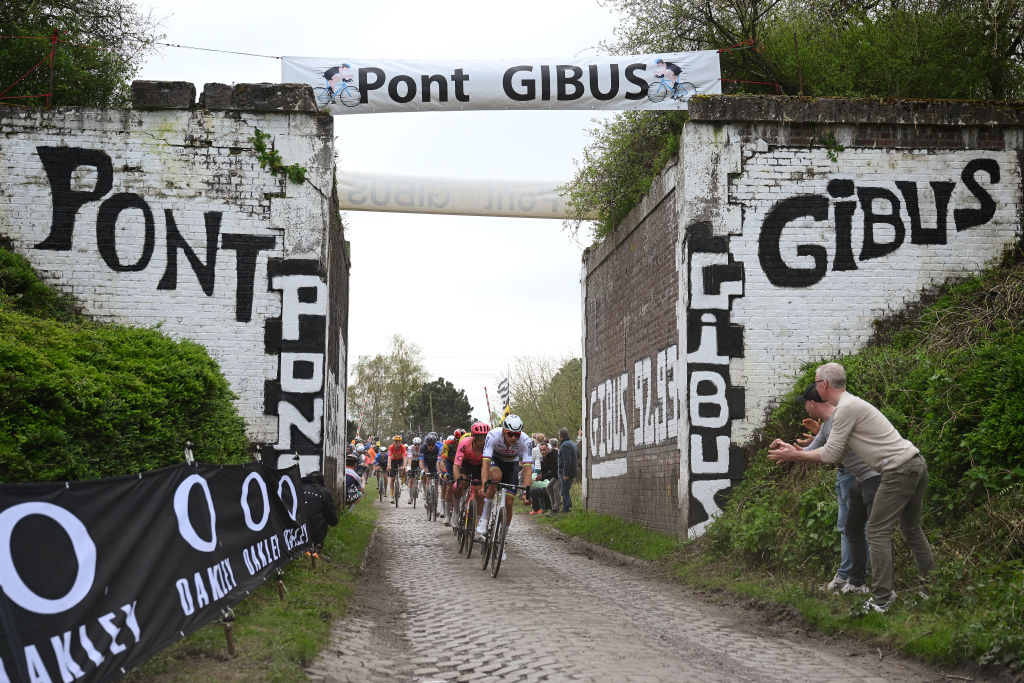
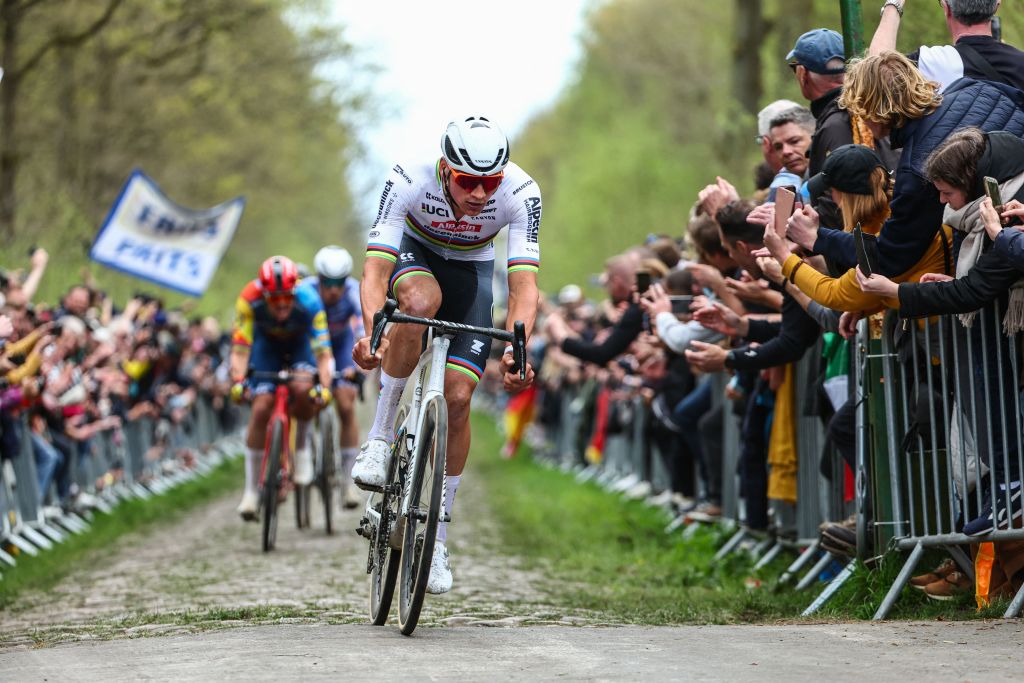
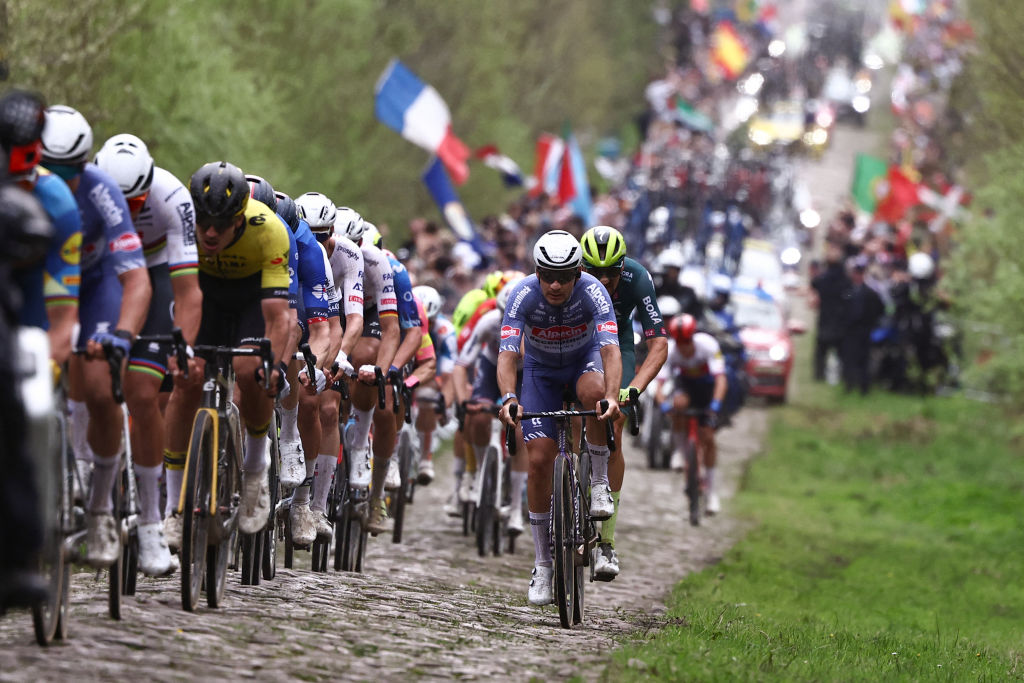
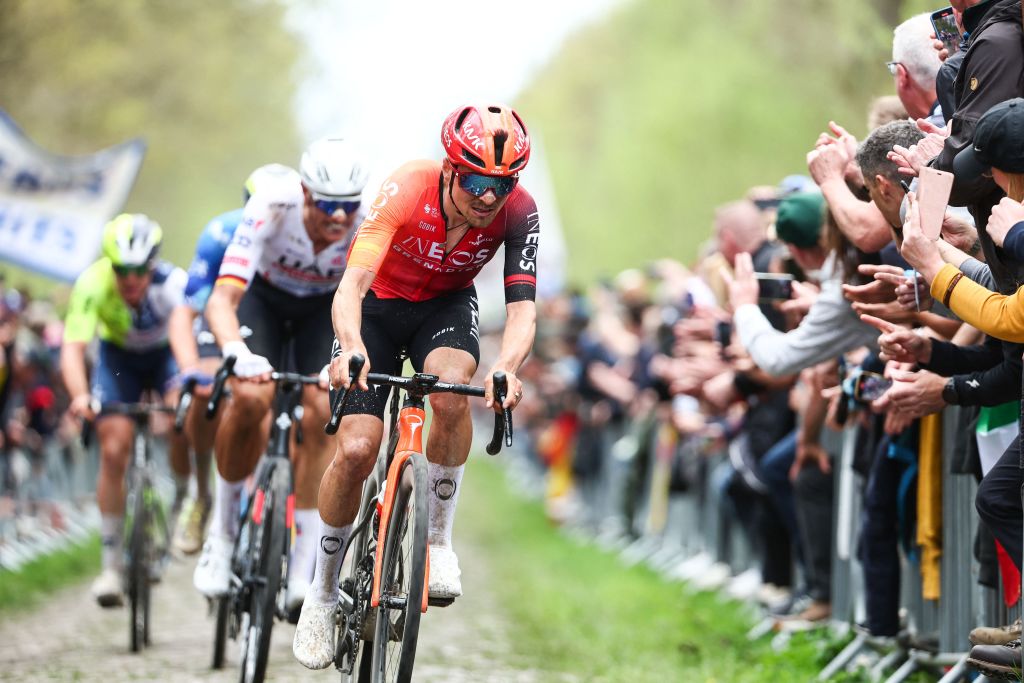
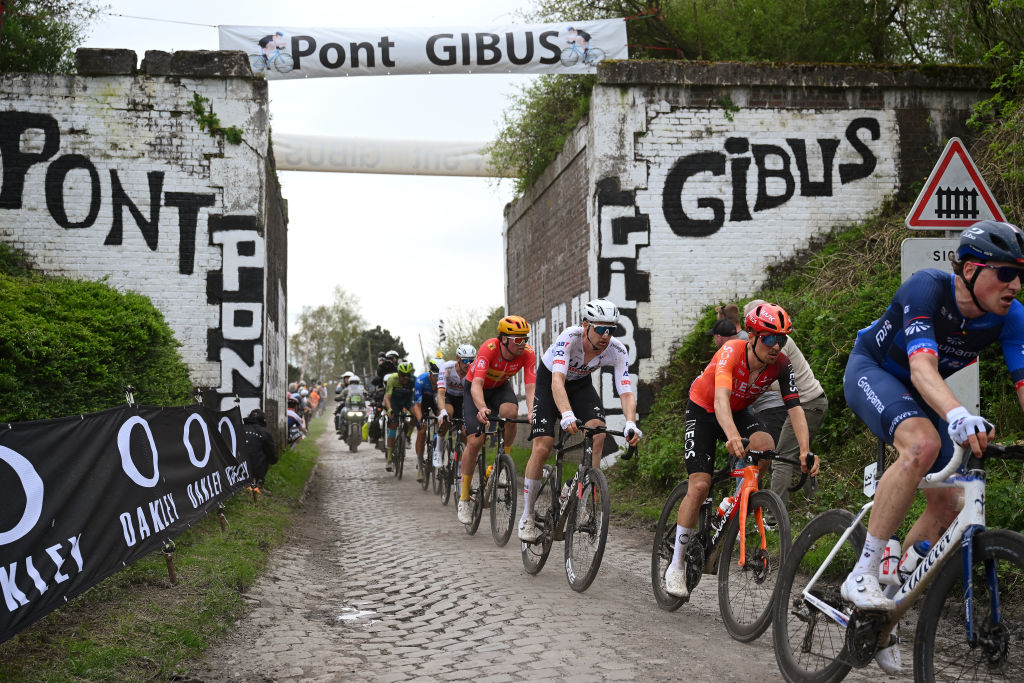
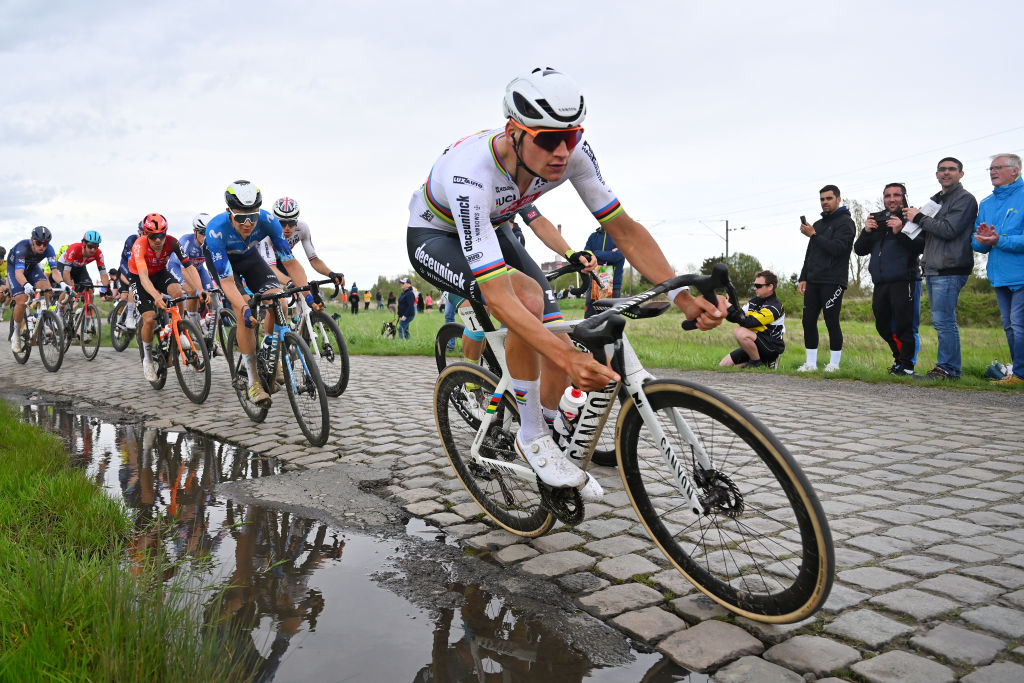
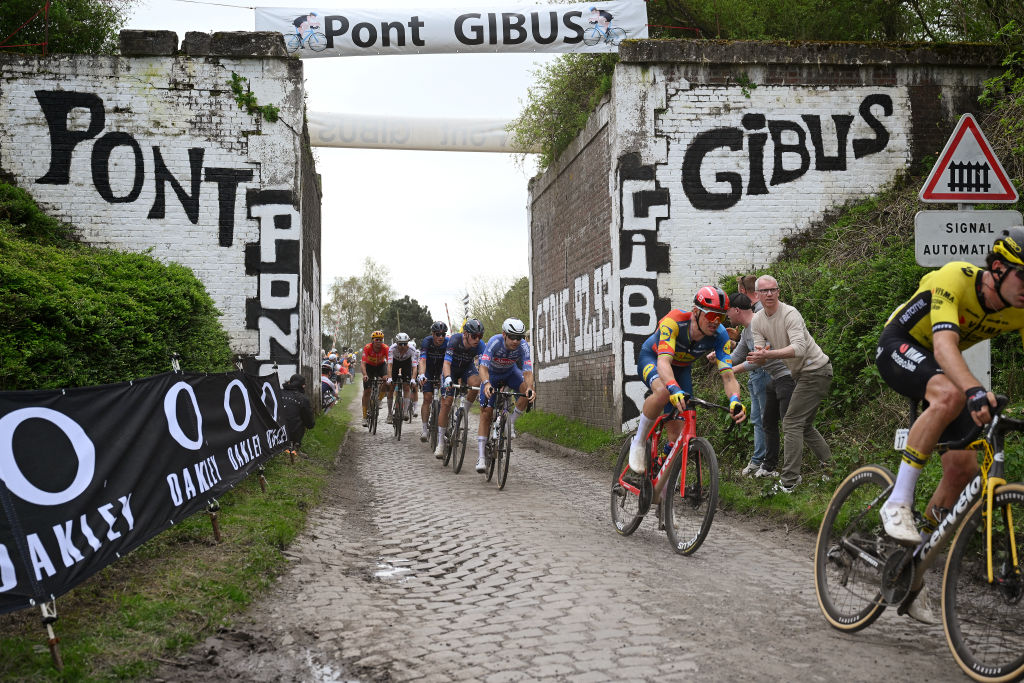
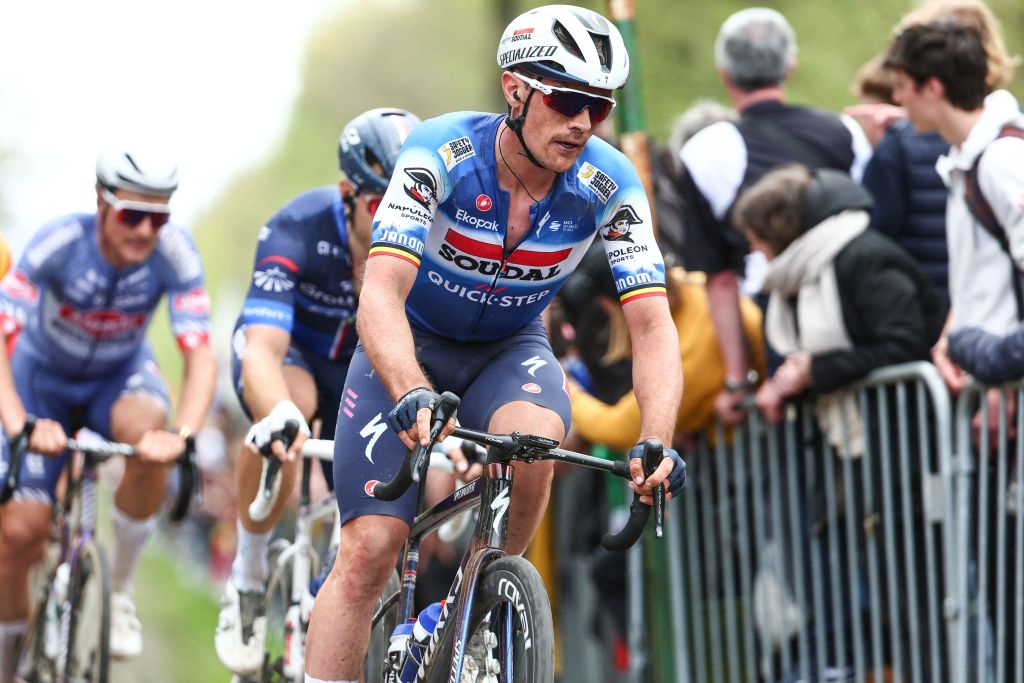
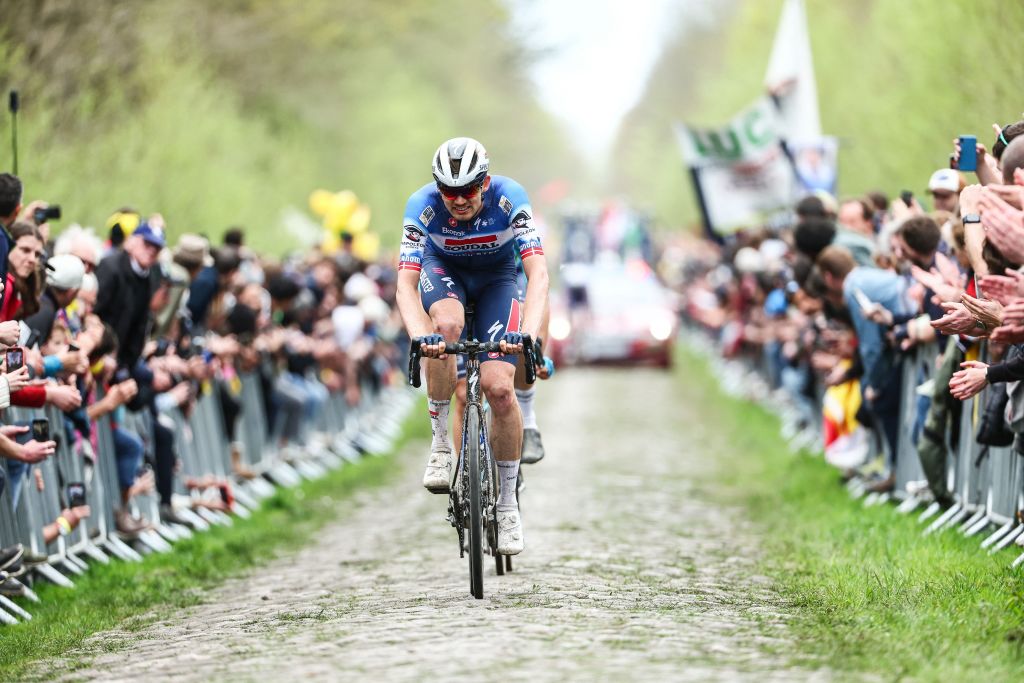
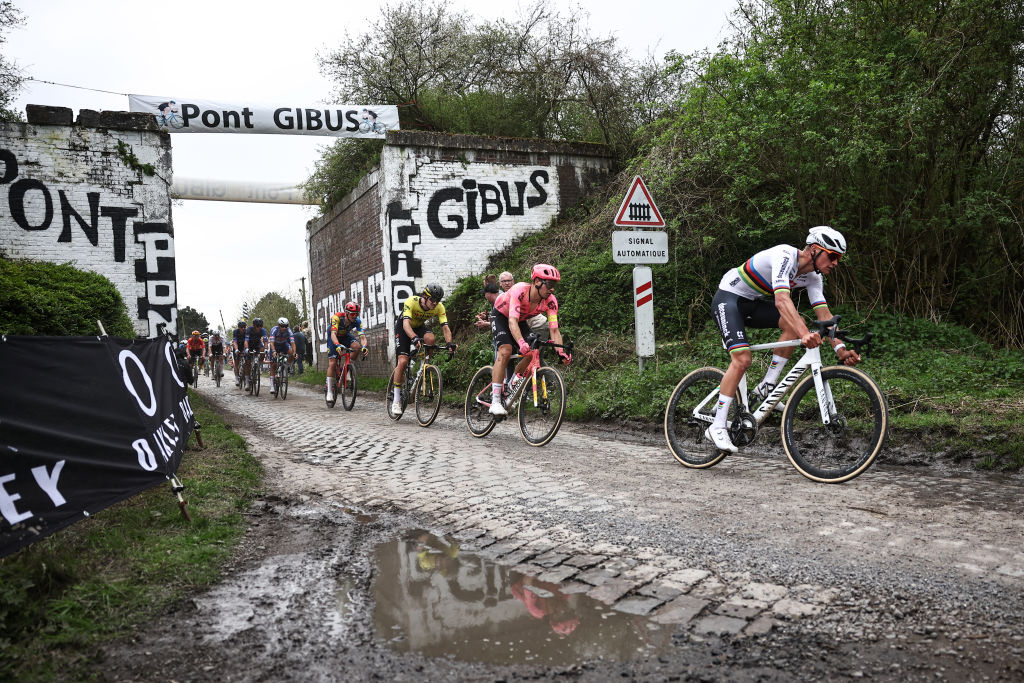
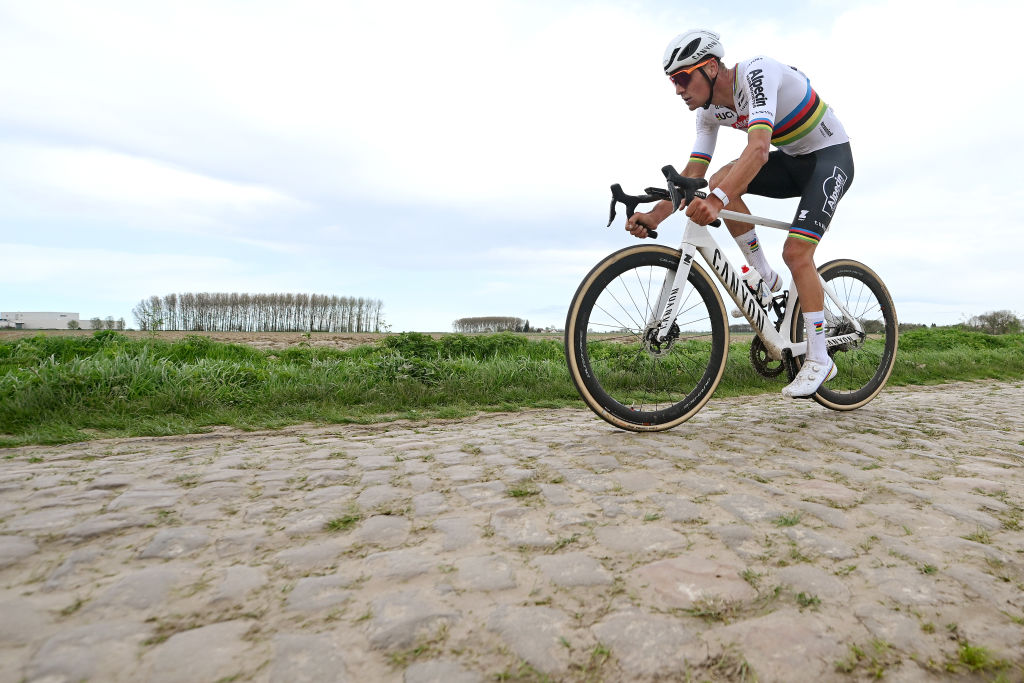

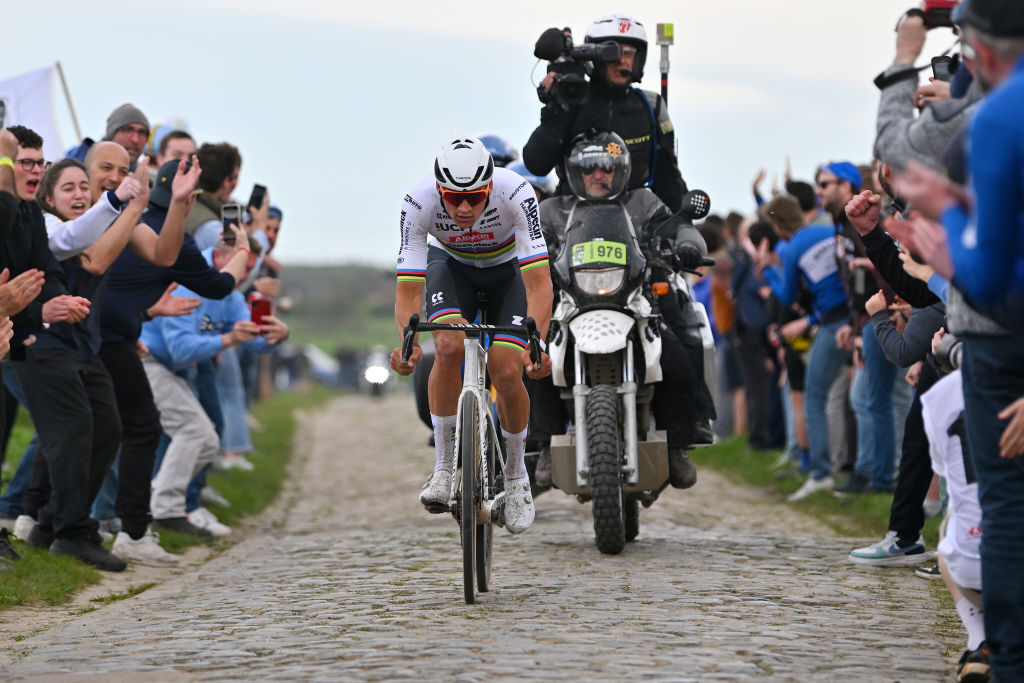
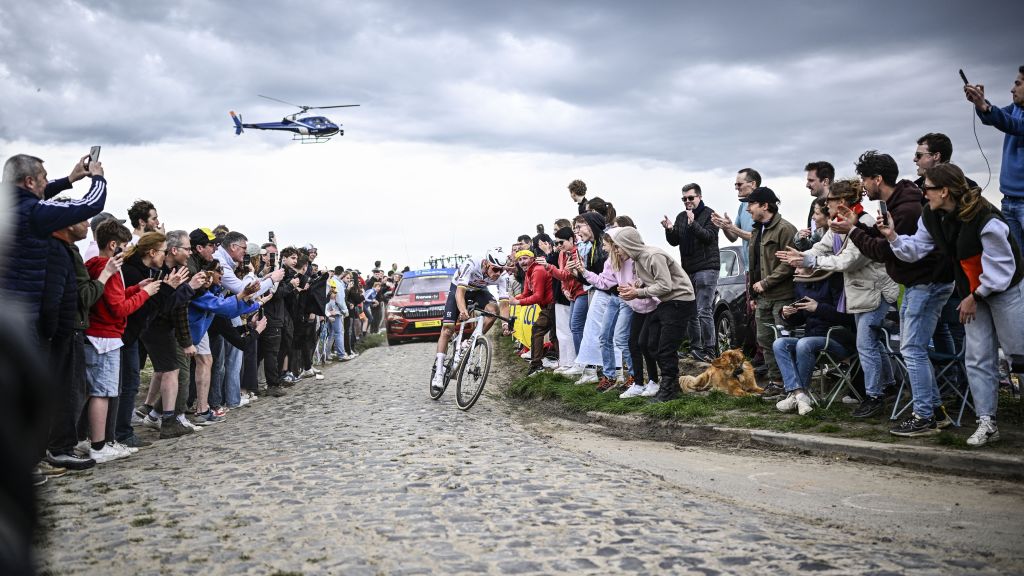
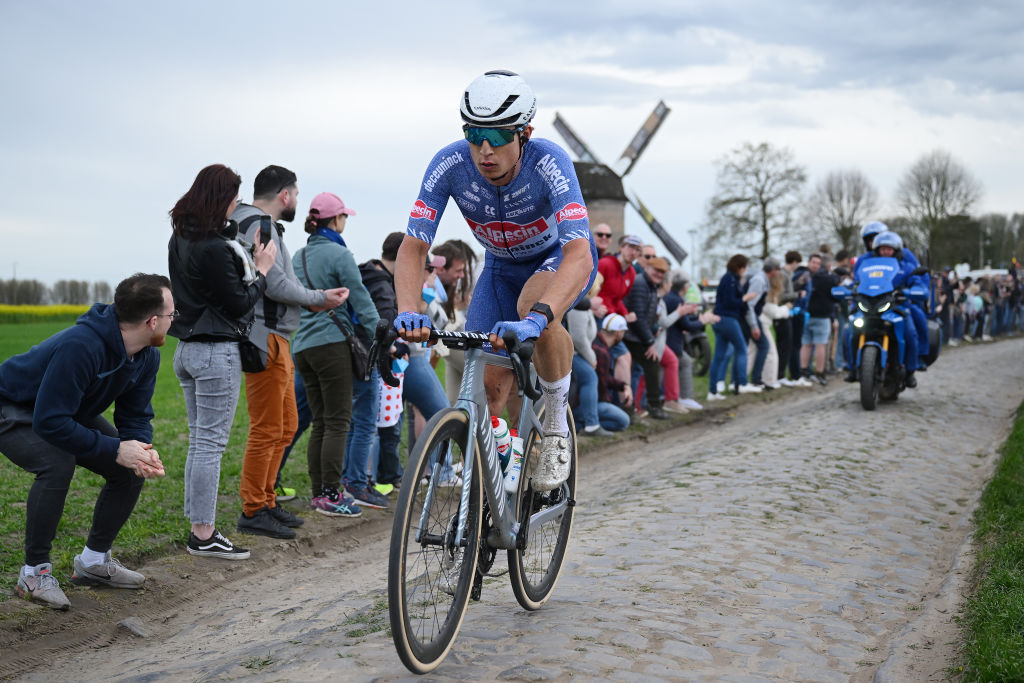
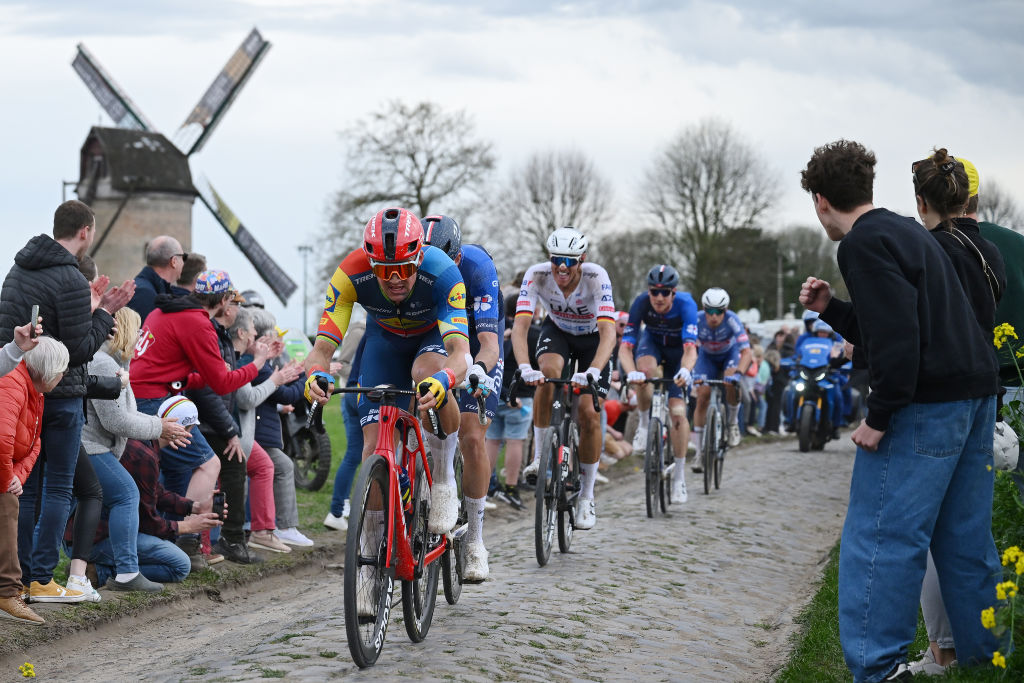
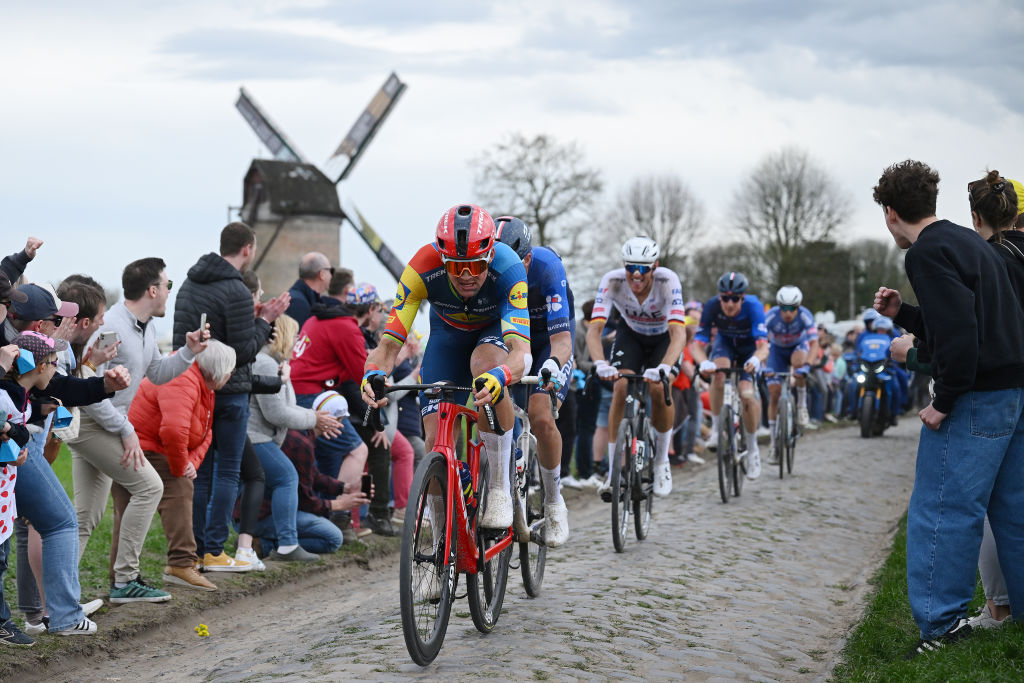
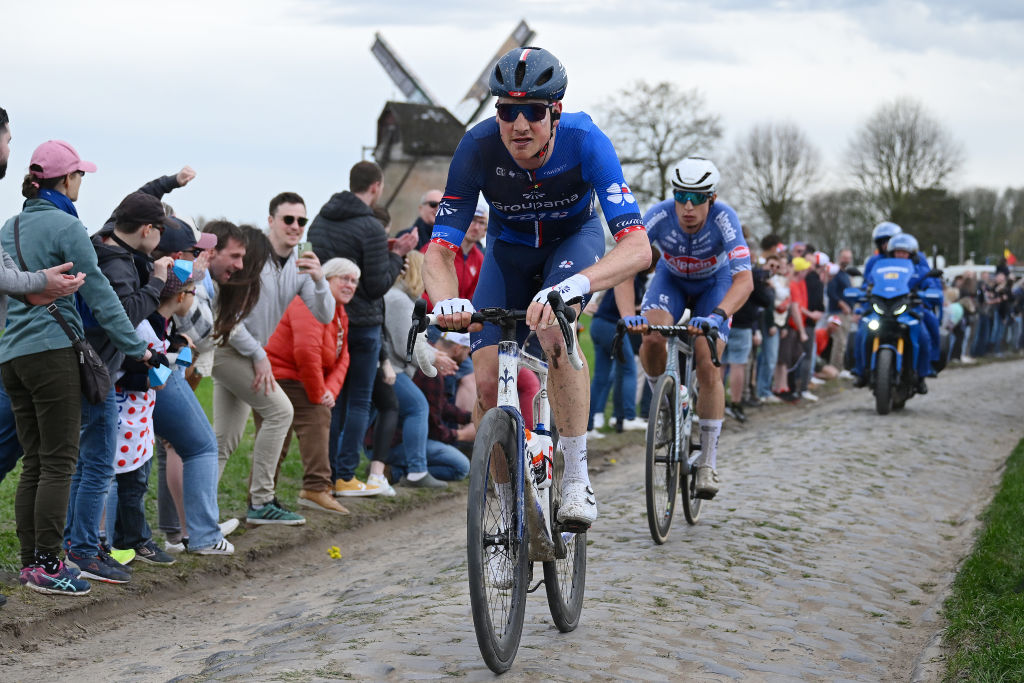
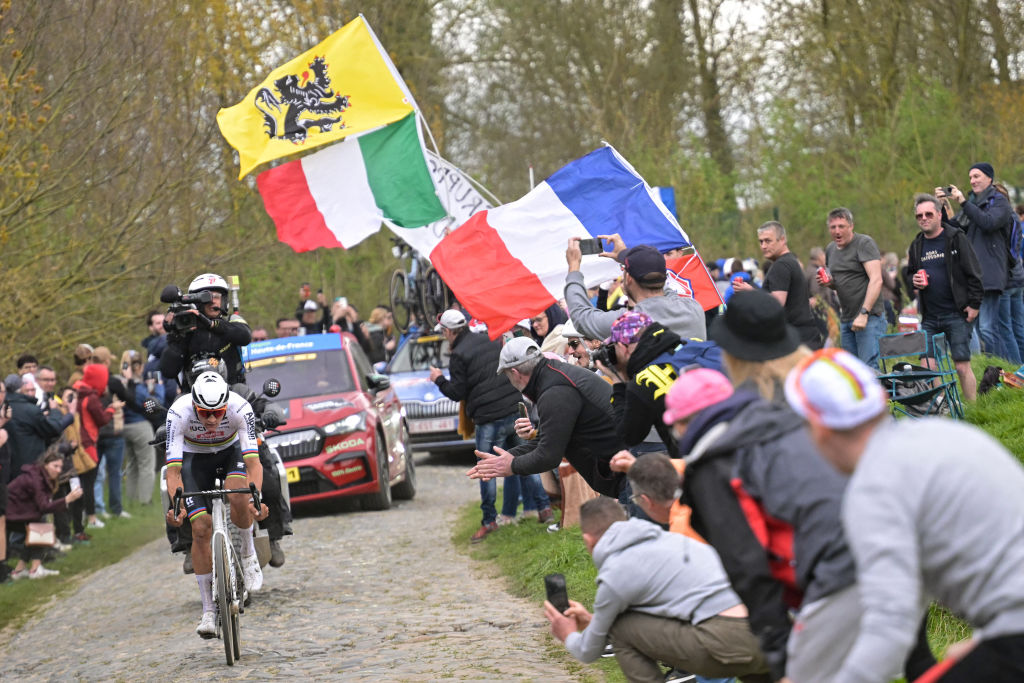
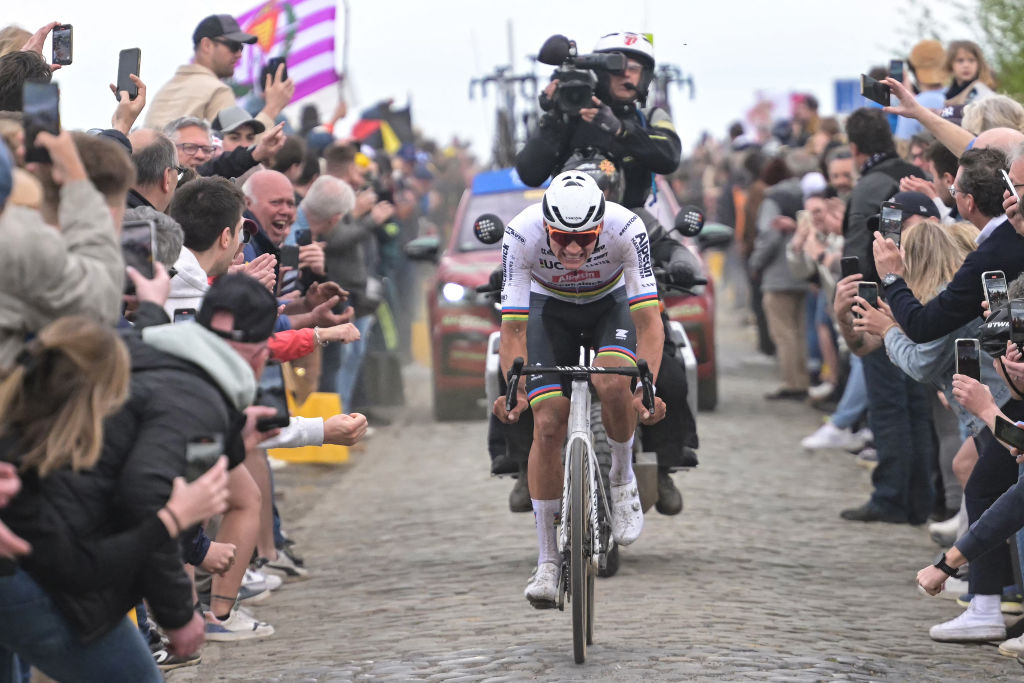
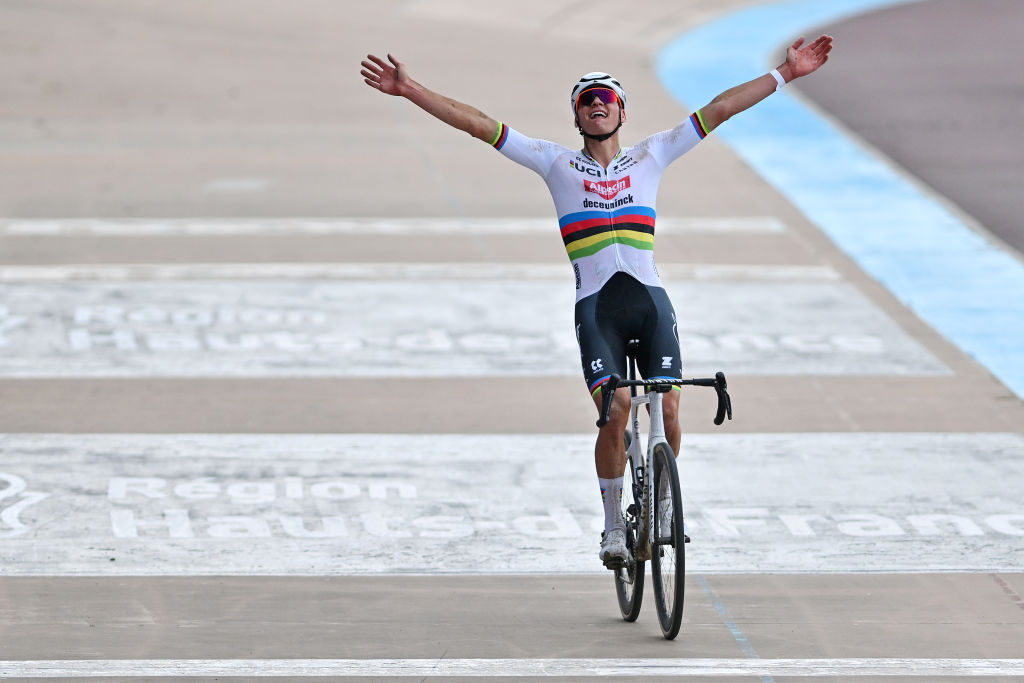

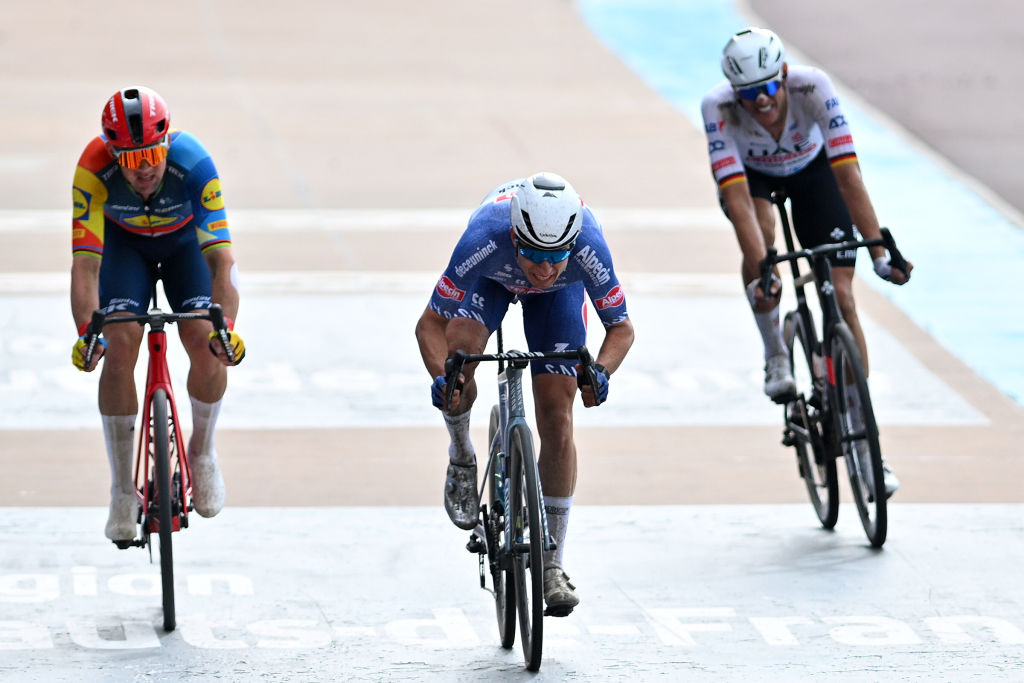
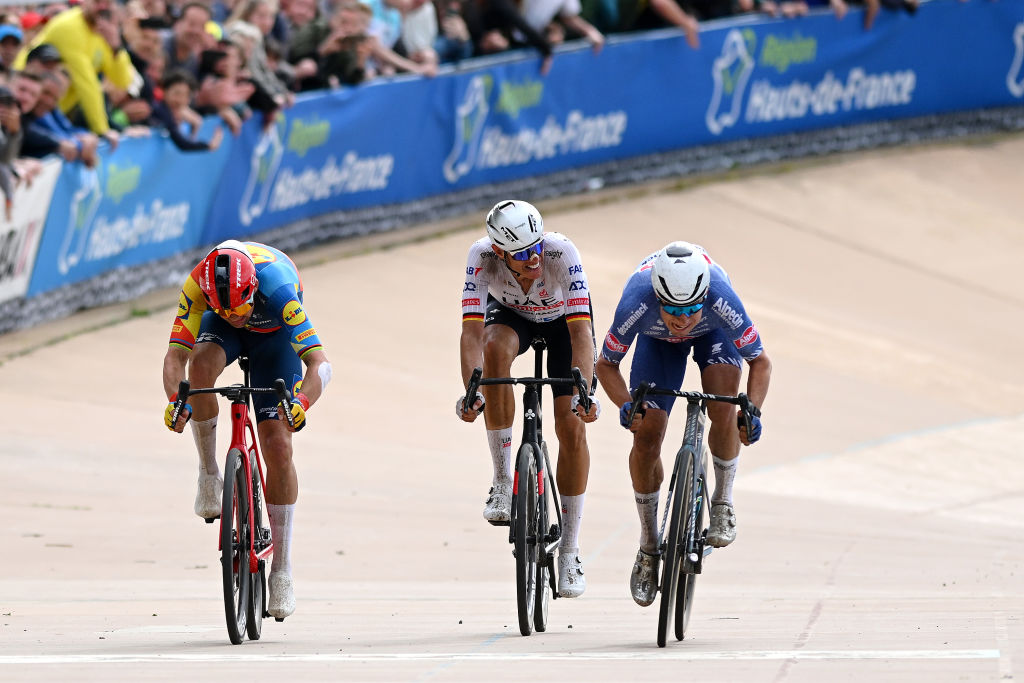
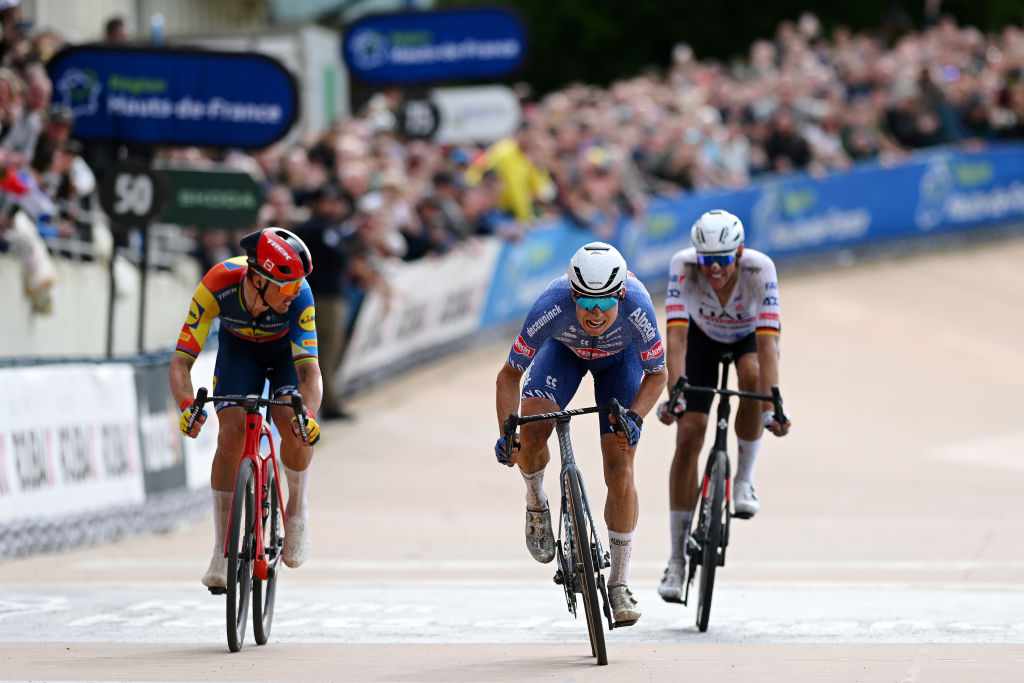
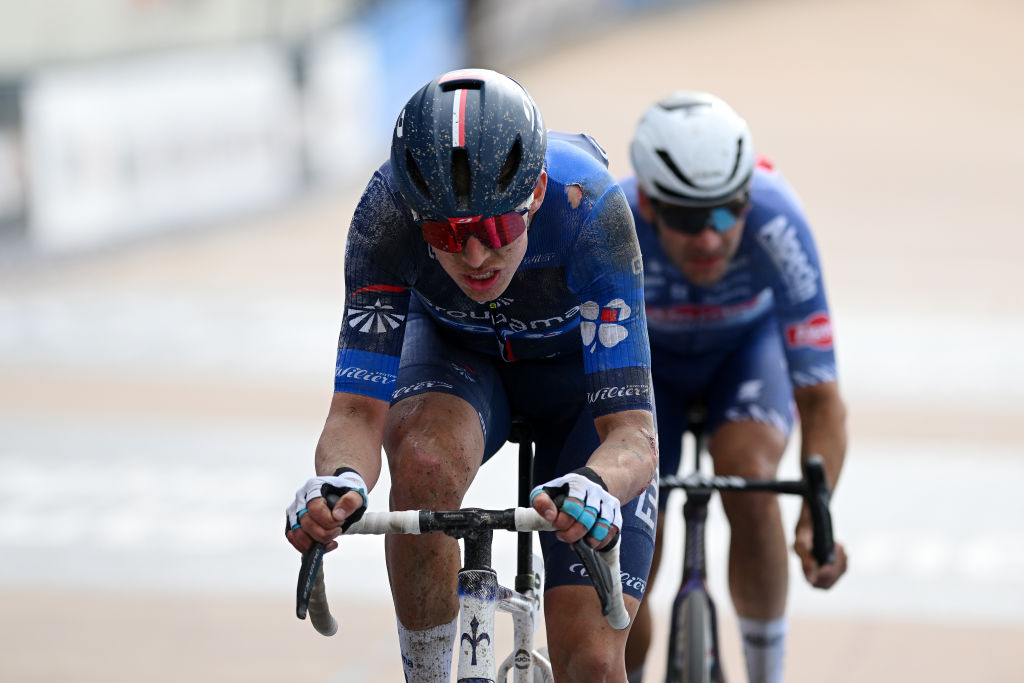

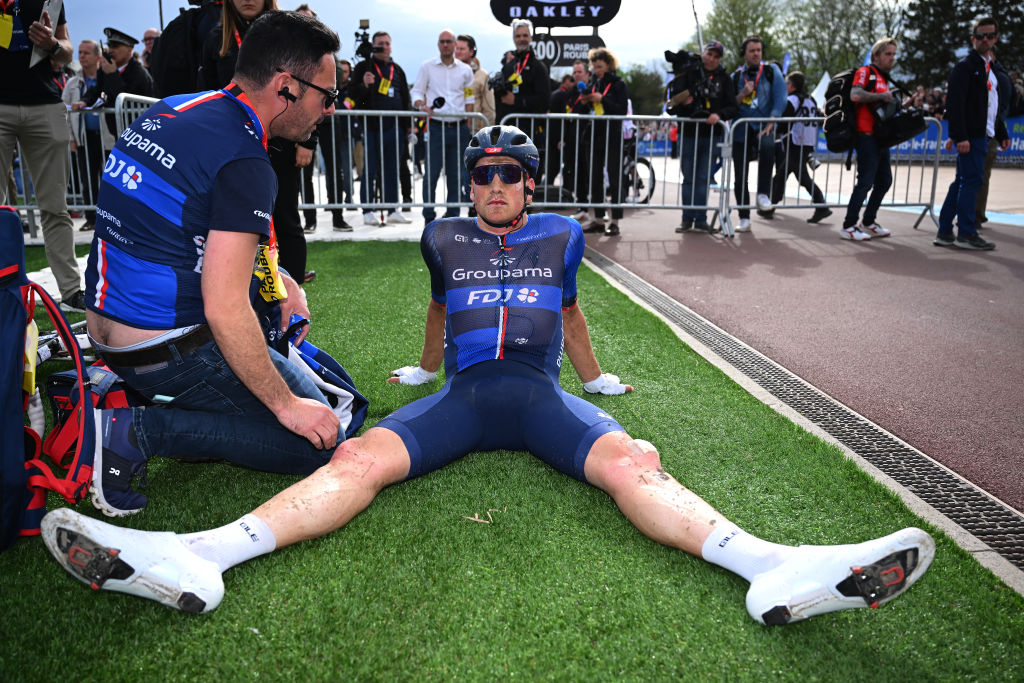
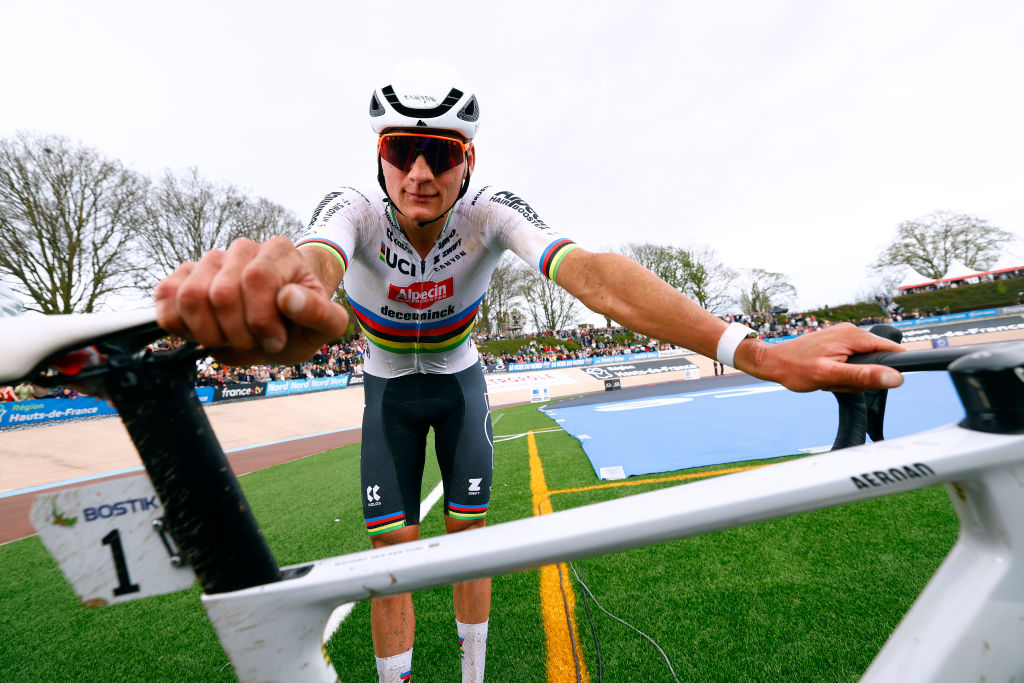
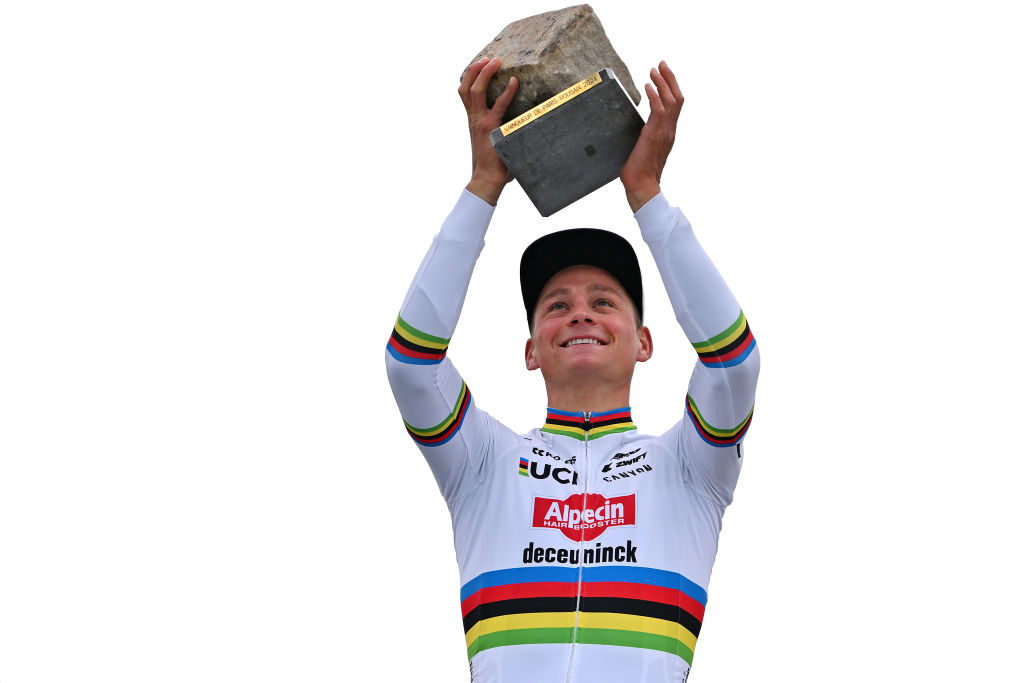
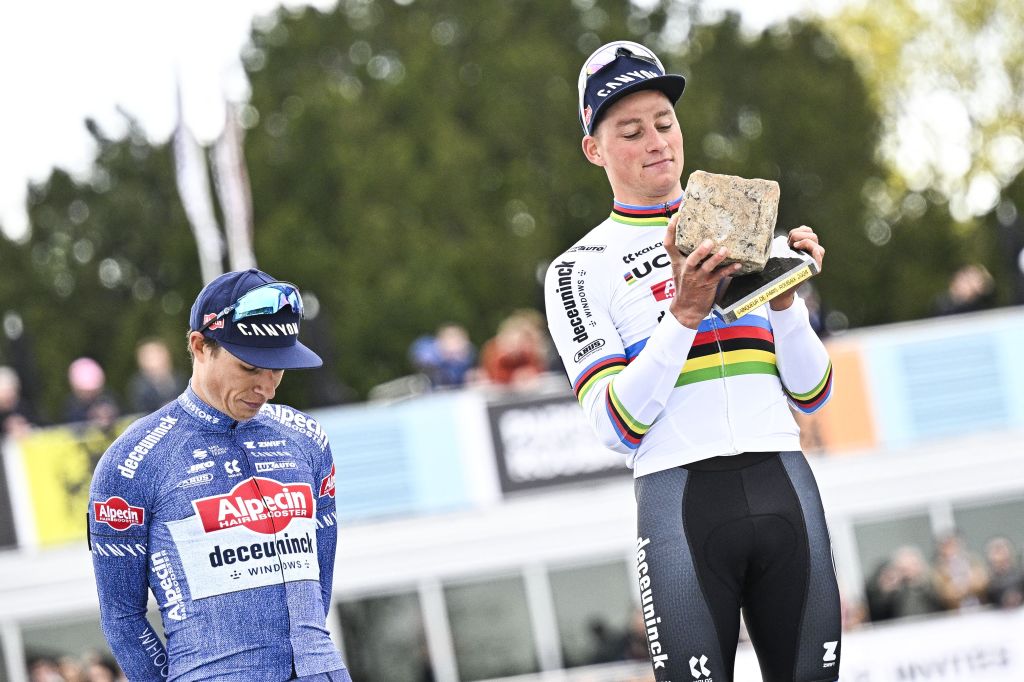
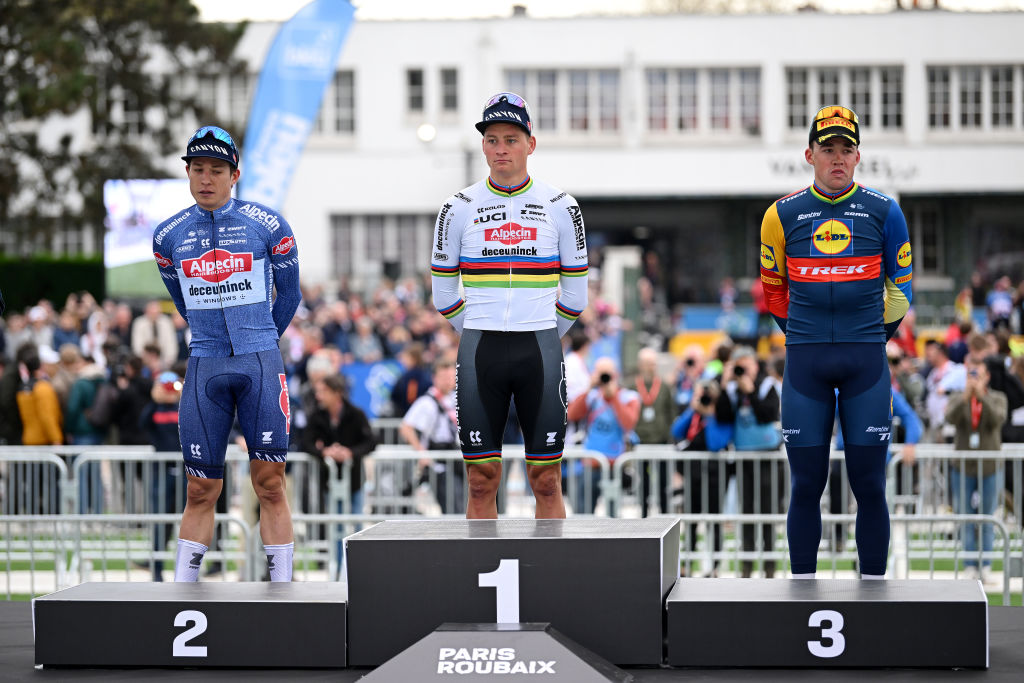
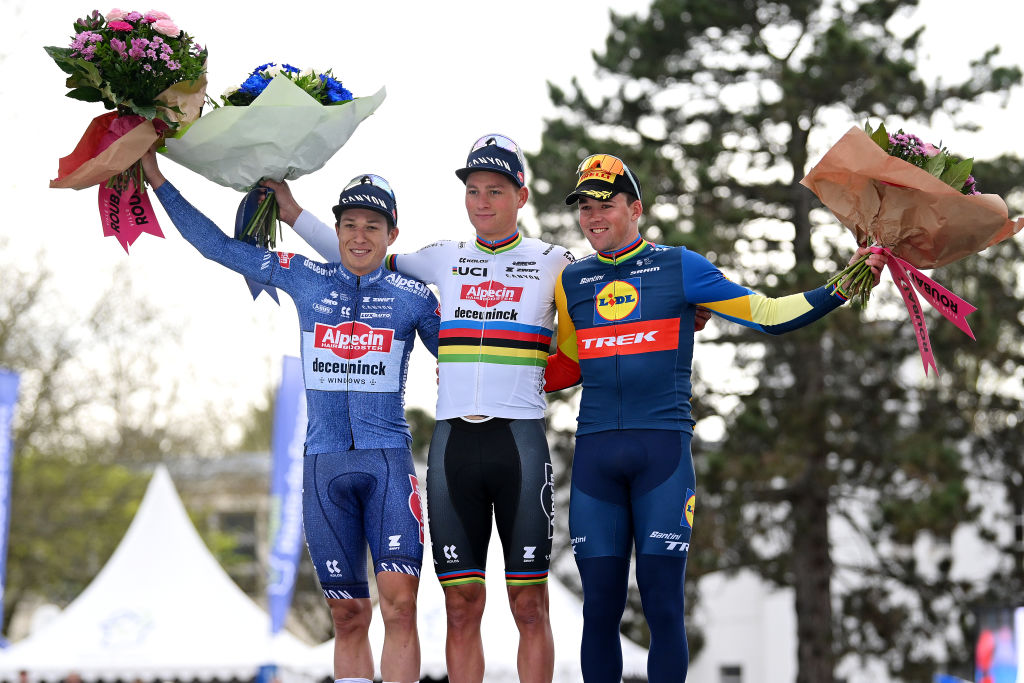
Reigning World Champion Mathieu van der Poel (Alpecin-Deceuninck) scorched home solo to a second successive victory in the fastest-ever edition of Paris-Roubaix, simultaneously becoming the first rider in 11 years to clinch the Tour of Flanders-Roubaix double.
Second place in the historic Roubaix velodrome was Jasper Philipsen, for a 1-2 for Alpecin-Deceuninck, outsprinting Mads Pedersen (Lidl-Trek) in third and Nils Politt (UAE Team Emirates) fourth.
“It’s hard to believe, actually. Again, with the team, maybe even stronger than last year. I’m super proud of the boys and very happy to finish it off,” Van der Poel said at the finish line.
Asked if it was planned to attack from so far out, Van der Poel said, “No, not really; I wanted to make the race hard from there on because I know that’s my strength. I felt super good today, and when I had the gap, I knew with a tailwind to the finish line for the most part, but I had a really good day today.
“Of course, you always know in Roubaix that there’s the possibility of a puncture, but I had the team car with me, and I was quite confident. I could really enjoy the moment more than last week [in Flanders] because then I was on my limit. This time, I could really enjoy the last part.”
After iron control from Alpecin-Deceuninck left the race in Van der Poel’s grip very early on, the Dutchman attacked with 60 kilometres to go. At 20 kilometres further on, his advantage had risen to over two minutes, and barring disaster, the race was all but over.
Van der Poel has thereby claimed his sixth Monument of his career and, after his third Tour of Flanders, his second of 2023.
Van der Poel has also become the second World Champion after Lotte Kopecky (SD Worx-Protime) to claim Paris-Roubaix in as many days and the first in the men’s race since Peter Sagan in 2018.
How it unfolded
The Queen of the Classics began with news of one key DNS, 2022 Dylan van Baarle (Visma-Lease A Bike), and for the first 20 kilometres, the usual flurry of early attacks failed to produce any serious consequences. Some interesting moves by riders as high-profile as Alexander Kristoff (Uno-X Mobility) were quickly suffocated, but despite a dauntingly fast start covering nearly 50 kilometres in the first hour, a seven-man break including Kasper Asgreen (Soudal-QuickStep) - like Kristoff a former Flanders winner - was finally able to make it ahead.
While the peloton was forced to handle a large early crash that saw both Jonas Rutsch (EF Education-EasyFirst) and Elia Viviani (Ineos Grenadiers) abandon, the seven riders in the front carved open a gap of some 90 seconds. Per Strand Hagenes (Visma-Lease A Bike), Rasmus Tiller (Uno-X Mobility), Asgreen, Marco Haller (Bora-Hansgrohe), Liam Slock (Lotto-Dstny), Gleb Syritsa (Astana Qazaqstan) and Kamil Malecki (Q36.5) were then joined by another two hopefuls, Dries De Bondt (Decathlon-AG2R) and Serbian National Champion Dusan Rajović (Bahrain-Victorious) and the nine-man early break of the day was formed.
Asgreen’s status perhaps meant that the group was given little advance leave, or maybe the peloton nursed hopes of long-distance moves to outpace arch-favourite Van der Poel. Whatever the reason, when the nine hit the first three-star sector of cobbles at Troisvilles à Inchy, their margin of 1:30 was much lower than in other years, thereby rendering Alpecin’s task of draining the race of opposition to their leader that much easier.
Alpecin-Deceuninck and UAE Team Emirates drove hard on sector 29 and continued in the same vein on sector 28. The ferociously high pace, still averaging over 50km/h in the tailwinds, and stubbornly dry conditions —contrary to expectations—then saw Roubaix debutant Tim Wellens open the throttle even further on the first four-star cobbled section at Quievy to Saint-Python. Such was the speed that when Alpecin-Deceuninck’s Oscar Riesebeek pushed the pace just a little higher, the bunch instantly began to crumble apart.
Suddenly and even though there were still a staggering 150 kilometres left to go, just 60 riders were left on the front, no less than six of them from Alpecin-Deceuninck. That number shrank even faster as a crosswind kicked in, and Van der Poel was always in second or third place, chivvying teammates through or occasionally bustling to the fore himself.
It seemed incredible that the race should have split apart so soon. “Never seen this before,” three times winner and commentator Sean Kelly sagely observed on Eurosport. But as the 40-strong leader’s group swept up the break long before the best-known sectors of cobbles, one main chapter of the 2024 race had obviously already unfolded.
It was true that former winner John Degenkolb (dsm-firmenich-PostNL) was present along with Stefan Kung (Groupama-FDJ), Mads Pedersen (Lidl-Trek) Time Wellens and 2018 Roubaix podium finisher Nils Politt (both UAE) along with debutant Tom Pidcock (Ineos Grenadiers) - whose teammate Josh Tarling was summarily booted off the race for taking too long a tow. But the notable lack of attacks on the front was due to this scarily high pace spoke volumes about what could be to come, and even if Alpecin’s Timo Kielich and Oscar Riesebeek were both unlucky enough to puncture in quick succession, the pre-race favourite’s team were clearly dominating from an intimidatingly long way out.
A holding pattern then emerged as far as the difficult sector 20, Haveluy and the most intriguing moment of potential rebellion against Van der Poel and his teammates then arose when one Lidl-Trek rider, Mattias Vacek, tested the water for Pedersen. But when moving into the Arenberg (with no incidents on the notorious chicane), Pedersen might have been leading, but Van der Poel was still in fourth place. And then, whether he was searching for a better line or not on Arenberg, the Dutchman suddenly surged ahead, and by the far side of the forest, only Pedersen, Philipsen and Mick van Dijke (Visma-Lease A Bike) were able to follow and even then at a distance.
100 kilometres out was too early to continue to break away, even for Van der Poel, but as ever at Arenberg, the writing for what was to come was already on the wall.
The race tide that had been flowing steadily Alpecin’s way eddied briefly as Philipsen punctured and Kiwi Laurence Pithie (Groupama-FDJ), riding notably in his debut, briefly made a dig. But Vermeersch clamped down that move, and Van der Poel, keen to deter his rivals, then personally policed the break himself, allowing Philipsen to move back into the tiny front group of a dozen riders.
Again, there was a little intrigue when, 87 kilometres from the line, Van der Poel’s teammate Vermeersch seared away with Pithie and Politt in his wake. But even this formed part of Alpecin’s long-term strategy as Van der Poel weaved back and forth in the second group, clearly comfortable with having a teammate up the road and allowing his rivals to panic.
The return of a dozen-strong second group swelled the main peloton to 20 and allowed Pedersen’s team to begin the chase as the Vermeersch move’s advantage drifted up to 30 seconds. Yet if Pedersen’s hard drive in person on the sector 15 Tilloy sector reeled in the trio ahead at the feed zone a few metres further on, every single dig, be it by Tim Wellens or Laurence Pithie, was controlled by Alpecin-Deceuninck as the kilometres clicked down.
60km solo
Then, with 60 kilometres to go, the inevitable moment finally came. Van der Poel launched the attack from fourth place in the line, blasting past his rivals with an acceleration that simply nobody could match.
Storming out of each cobbled sector at a ferocious velocity, ignoring offers of bidons from team assistants, with Philipsen and Vermeersch shadowing the rivals' moves, everything suggested that this was Van der Poel’s moment.
With 50 kilometres to go, his margin was already rising to nearly a minute; with 40 kilometres to go, it stood at 1:46, and the sense amongst the chasers that they were racing for second by this point must have been overwhelming.
Paris-Roubaix might be the hardest race to control, but this year, Alpecin-Deceuninck showed they had mastered the strategy, and Van der Poel was putting in - even by his standards - a performance of a lifetime.
Last year it had been 14 kilometres out from the Roubaix velodrome that Van der Poel went solo, this time it was nearly four times that distance. But either way, it barely mattered: nothing, it seemed, could stop him.
Behind a five-man group of the best of the rest briefly emerged, containing Politt, Pedersen, Philipsen, Stefan Küng (Groupama-FDJ), Pithie and Mick van Dijke (Visma-Lease A Bike). Yet again, though, the presence of Alpecin-Deceuninck’s Philipsen shadowing every move dented their enthusiasm.
There were a couple of slightly misjudged corners by Van der Poel that might have changed things, and by the time the gap hit two minutes and hovered there for more than 20 kilometres, it was clear that Van der Poel moved into control mode and wanted to conserve his strength against the possible onset of last-minute cramps. Yet no matter how hard the final hour’s terrain - from the tough sectors like Orchies where Tom Boonen used to launch trademark attacks to the traditionally crucial Camphin-en-Pevele and the Carrefour d’Arbre where he took his first ever Roubaix - Van de Poel forged on relentlessly.
To all intents and purposes, by this point, his lone ride to a repeat Roubaix triumph was a re-run of last week’s solo victory parade to Flanders. However, as the gap rose to nearly three minutes in the closing sectors, almost without him trying to force the pace, it was arguably even more impressive.
12 kilometres from the line and on one of the last segments of cobbles, Alpecin was logically so confident of Van der Poel’s victory that Philipsen then opted to make his own move to fight for second. It didn’t work, but his late attack eliminated Küng from the running while a violent fall for Pithie slightly earlier had weakened the already flailing opposition even further.
Into the suburbs of Roubaix, Van der Poel exchanged a triumphant fistbump with his team director, Alpecin-Deceuninck’s position as the first squad ever to win Sanremo, Flanders and Roubaix in a single season now all but certain. All that remained to be seen as he swept into the velodrome to rapturous applause and the bell rang for his last lap was how he would celebrate such a historic victory, with Van der Poel opting, rather than raising his bike in the air like at Flanders, to go for a straightforward, but clearly heartfelt, celebration.
Philipsen finally soared home for his second place in as many years, making Alpecin able to claim a Roubaix 1-2 for the second April running and leaving Pedersen to settle for third. But the 2024 Paris-Roubaix real story was all about Van der Poel, victorious in another record-breaking race speed averaging 47.8 km/h, in what is very arguably one of his greatest wins to date.
Winning with the World Champion’s jersey on his back only made this latest triumph more special, Van der Poel said afterwards, telling reporters, “I never could have dreamed of this as a child. I was super motivated for this year, and I wanted to show the jersey in a nice way. But this goes beyond expectations; I’m a bit lost for words.”
Results
Results powered by FirstCycling







